- ANDES
- CENTRAL AMERICA
- CHINA
- EAST & CENTRAL AFRICA
- THE NETHERLANDS
- NORTH AMERICA
- SOUTH AMERICA
- SOUTH & SOUTH-EAST ASIA
- SOUTHERN AFRICA
- WEST AFRICA
Solidaridad Andes has made a significant impact in sustainable coffee in 2015. Almost 60% of coffee production in Colombia is now sustainable certified or verified and we have supported 80,373 smallholders in producing more sustainable coffee. In the gold sector, we have been working on improving legislation for artisanal miners. In other sectors, environmental and climate change issues were high on the agenda and led to concrete improvements in dealing with water contamination and deforestation.

Measurable results, proven innovation, published research and increased international visibility led to strengthened multi-actor engagement in multiple sectors. The stage is set for upscaling interventions at national and regional levels. Sectors move from farm to landscape in continual improvement schemes. Efficiency and leverage matter as good practices are increasingly considered “business as usual”.

With growing concerns over water scarcity and climate change, Solidaridad leads with sustainability as a viable investment for the future of the Chinese market.

Solidaridad East & Central Africa made concerted efforts to explore new partnerships and funding opportunities. In early 2015, Solidaridad was awarded a pilot project by Ford Foundation and aBi Trust for fruits, vegetables and barley in Uganda. Solidaridad won a grant for a food security project from the Netherlands Enterprise Agency and Comic Relief gave a grant to Solidaridad for a food security project in Ethiopia. By the end of 2015, opportunities arose for policy influencing under Solidaridad’s new strategy.

Europe is dealing with tough issues like the debt crisis, refugees, terrorism and weak economic growth. Public support for international collaboration and foreign aid is under pressure. In the corporate world, the Volkswagen scandal damaged public trust in how industry adheres to the law. Solidaridad’s answer to these growing populist and nationalist sentiments is clearly described in the new multi-annual strategy. To solve the big global issues of the next generation, we need more international collaboration, institutional reforms and good

Solidaridad North America continues to develop significant partnerships with companies, foundations and government agencies, engaging in an ever-widening range of activities. The highlight of the year was the consummation of a partnership with the MasterCard Foundation to implement a five-year, $15 million youth empowerment programme in the cocoa sector of Ghana, starting in 2016.

The Natural Beef Standards was launched in Paraguay with active support from Solidaridad for the ARP, the main producer association in the country. Cattle ranchers who raise cattle with natural grasses, free of hormones and antibiotics as well as with protected forest corridors, have now organized codes of conduct and guides adapted to the local situation and regulations in Paraguay. The Rural Horizons tool developed by Solidaridad is helping producers in self-assessment and continual improvement.

Solidaridad signed two major agreements on sustainable and water efficient production for palm oil and sugarcane in India. The agreements were signed in the presence of Dutch Prime Minister Mark Rutte. The palm oil programme aims to save around 1 trillion litres of water over five years while supporting 50,000 smallholders. The sugarcane programme supports 35,000 sugarcane farmers in partnership with Ruchi Soya, NSL Sugar Limited, Rajshree Sugars and Chemicals Limited.

Solidaridad Southern Africa had a very interesting and challenging year. There was a major internal change at senior management level while external economic, environmental and sociopolitical conditions were rapidly changing in the focus countries. These changes were driven by the shifts in global markets and the effects of climate change. Solidaridad continued its work in the cotton, fruits, vegetables, livestock, sugarcane and soy sectors.

In 2015, Solidaridad West Africa continued its engagement with supply chain stakeholders in cocoa, oil palm, gold, and maize. This resulted in enhanced capacities of the producers and improved livelihoods of households. Through the promotion and adoption of best management practices and provision of supportive infrastructure, significant yield increases were recorded. For example, there was an average yield increase of about 50% in cocoa, 160% in oil palm and 67% in maize.

Foreword by Nico Roozen
In everything we do, we recognize that success is founded on the strength of our network organization and our partnerships. We have taken every opportunity to encourage businesses to take on sustainability commitments for the benefit of their business and the communities in which they work.
In 2015, in a review on a global scale, the Solidaridad Network took stock of its commodity programmes and the implementation of strategies for moving beyond certification. The process, and the results, have led to a new five-year strategy for intense, transformative action before 2020 that you can read about in the strategy section of this report. Our approach for the coming years has received the support of diverse national governments and our major partners, culminating in our “AMBITION 2020” multi-annual strategy that was launched in Ghana at the beginning of 2016.

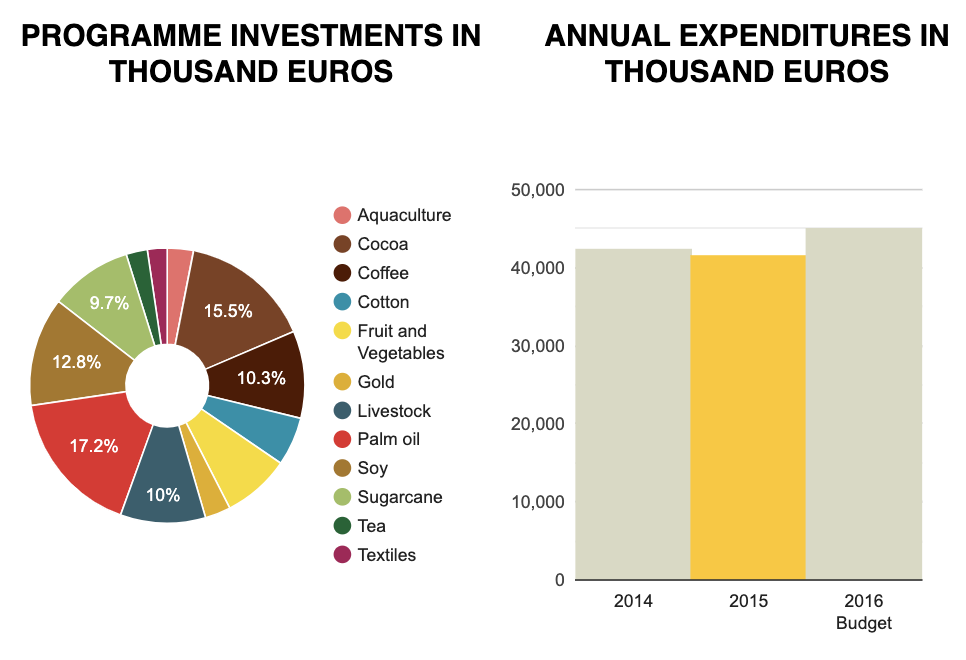
In September 2015, we launched the “Sugarcane: Fuel for Change” campaign and generated strategic discussions with partners both through social media and in person about better working conditions for sugarcane cutters. The initiative “Fruit for Thought”, launched in October 2015 at the AIJN Juice Summit in Antwerp, engaged leaders within governments, corporations and universities about using technology creatively to empower farmers to monitor and improve their own agricultural practices. In November, we sent an international delegation to the UN Climate Conference in Paris to reach out to business leaders about Solidaridad’s vision for sustainable landscape development.
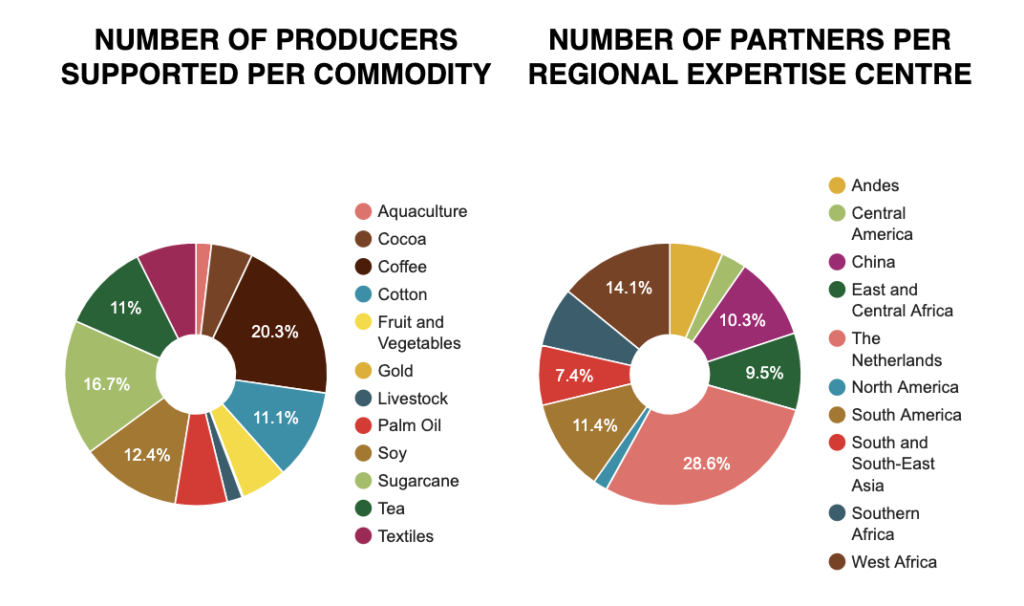
This year’s report provides examples that demonstrate Solidaridad’s impact from the global to the local level. We are proud to have been part of new international trade relations between China and Brazil for the production of sustainable soy, influencing the development of an exploding cotton and textile industry in Africa, and getting technology solutions in the hands of South American farmers in the form of Rural Horizons. Our organization is growing and adapting quickly to meet specific needs in many regions. Across the world, Solidaridad is present, working with its partners in its role as catalyst, supporter and leader for sustainable business and better working conditions.
As this report emphasizes, Solidaridad is strongly committed to collaboratively setting new norms, delivering well-targeted programmes, and working with influential partners both globally and locally to accelerate the pace of change.
Solidaridad programmes set in motion in 2015 will impact generations to come.
Nico Roozen
Executive Director
VISION AND MISSION
CREATING CHANGE THAT MATTERS
In everything we do, we are driven by our vision and mission. We seek partnerships with others, collaborate with industries and aspire to be a financially sustainable organization. We will always ensure that what we do contributes to our vision of a sustainable and inclusive economy that maximizes the benefit for all.
Solidaridad is an international network organization with partners all over the world. There is a single agenda and a single strategy: together we learn and progress, together we achieve results, and together we decide on future steps.
Solidaridad is an organization for international cooperation that draws inspiration from the vision, values and capacities of people all over the world.
Solidaridad is a transition manager, focusing on producer support and sustainable supply chain and market development. We partner with those who want to make a difference by changing business practices from being a part of the problem to being a part of the solution. Markets have to work for the poor, and companies are the key change makers.
From a shared vision to change that matters.
Our aim is to make an impact by being the best in building partnerships, in piloting and scaling up programmes, in learning and innovation.
Without a dream there is no first step. At the beginning there are no paved roads; simply by starting to walk, a path is created. Knowledge and values are needed. Skilled and motivated people are our capital. We are realists with a mission. We turn shared vision into meaningful impact in communities.
Solidaridad envisions a world where the people who produce the resources on which we all depend can contribute to change that matters, change that leads to prosperity for all, without harming each other or the environment. This therefore helps to ensure that resources will continue to sustain us for generations to come.
Today, the global economy is not organized in a sustainable way. Many of us now realize that an unsustainable way of life threatens food security, our planet and our businesses. With a world population projected to grow to 9 billion people by 2050, we can only be fed if the agricultural sector makes a transition to smart and sustainable land use. And, as fossil fuel use becomes increasingly problematic, a transition to a bio-based economy is needed. Farmers worldwide therefore have a bright future as providers of food and suppliers of renewable energy and raw materials. They link as never before the issues of food security for developing countries and prosperity for the world as a whole.
Many of us now realize that an unsustainable way of life threatens our food security, our planet and our businesses.
There is one agenda, one challenge: We have to produce more with less, and ensure that it is done in a way that sustains people and the environment. Optimizing land use is the first step towards a solution. Increased production must meet growing demand, but with fewer negative consequences for people and the environment. More efficient production must be coupled with less pollution. There must be greater precision in the use of fertilizers and pesticides, and a reduction in the use of water and energy. Waste then becomes a thing of the past. Losses in the supply chain are reduced. Forests are no longer cut down and additional land is no longer needed because existing agricultural land is being used more efficiently.
There is a single agenda and a single challenge: we must produce more with less and ensure that it’s done in a way that sustains people and the environment.
An inclusive economy – one in which people can participate fully – is needed. It should start with the recognition of the potential of smallholder farmers and women, who are often the leading drivers of sustainable change. It must respect workers’ rights, provide a safe and healthy workplace, and support a living income for farmers and workers.
For children, school is the best place to work. Mining and industry need to switch to a responsible means of production. Workers’ rights are respected and the environment is preserved for future generations, keeping its potential intact.
The change we seek is a market process driven by the private sector. However, civil society organizations and governments play an essential role in enabling and encouraging change. In this process, Solidaridad is a transition manager. We back farmers who are economically poor but have rich potential, entrepreneurial men and women, and workers who want to build their livelihoods on a fair income. Solidaridad partners with all parties in the supply chain, so that everyone can be involved in creating change that matters.
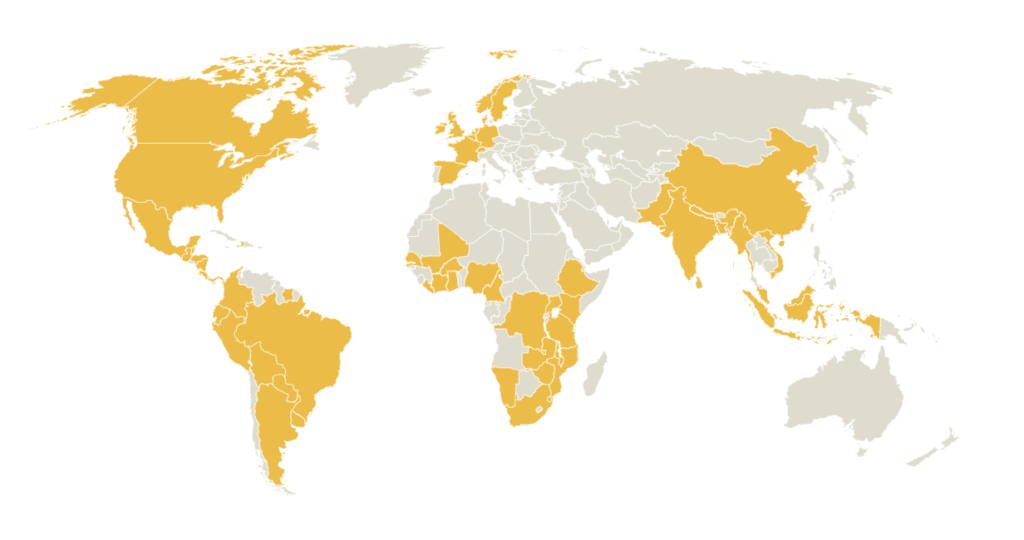
COMMODITY PROGRAMS
Solidaridad works to create sustainable supply chains from the producers to consumers. We manage global programmes for 12 of the world’s most important commodities. Visit the sections below to learn more about our impact in 2015.
SOLUTIONS NEED TO TRANSLATE INTO RESULTS ON THE SHELVES
In 2015, Solidaridad built on the Seafood Trade Intelligence Portal and the food security programme in Bangladesh to increase transparency in seafood supply chains and promote good practices. We also created partnerships with producers, input suppliers and buyers to pilot innovative solutions. For example, we took 15 European companies on a trade and investment mission to Myanmar, which led to two investment pilots for tilapia and shrimp. In addition, a partnership with Wageningen University, Deltares and Pur Projet set out to redesign shrimp-farming polders in coastal Bangladesh.
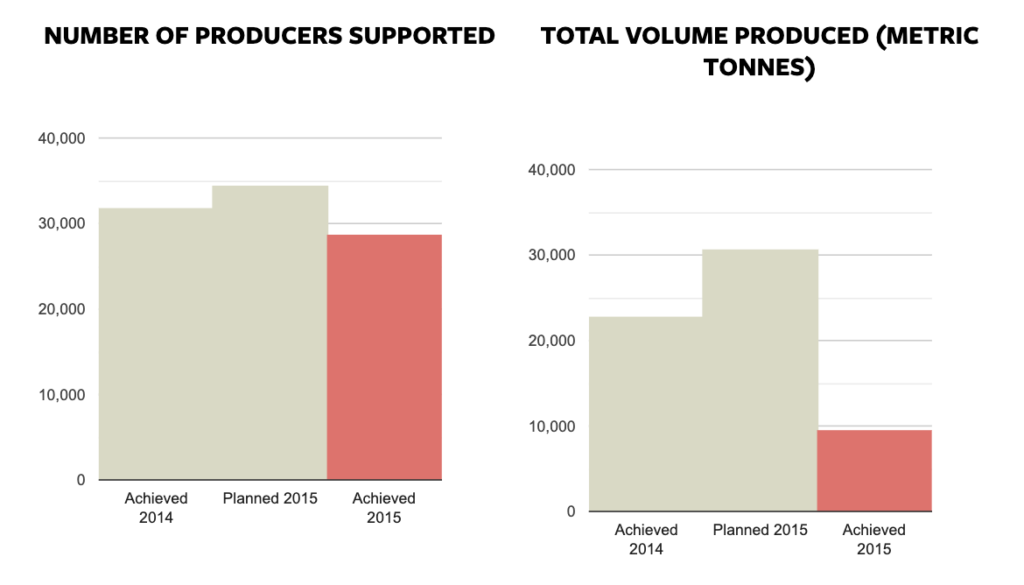
ACHIEVEMENTS
The Seafood Trade Intelligence Portal (STIP) increased its peer group to more than 15 members from the EU, the US, Asia and South America and set up collaborations with sector associations and local partners in Vietnam, Indonesia, India, the Philippines and Peru. We also saw initial investments in supply-chain development, notably with IFB of India, which was triggered through the STIP.
In Bangladesh, the aquaculture programme worked with 28,693 fish and shrimp farmers. The proportion of female farmers rose from 8% to 17%. Five farmers in our programme received the best farmer award from the Department of Fisheries for the successful adoption of good practices and yield increases in 2015.
Farmers’ income rose by 25% on average, chiefly through production increases and cost reductions. The costs associated with five key production factors were reduced by 17%, while a combination of improved post-harvest management, the establishment of four collection centres and collective marketing reduced post-harvest losses by 70%-89% and the cost of transportation and marketing by 48%.
The establishment of 230 demonstration plots to teach about eight good practices was crucial for our success. Around 89% of participants adopted at least one improved technology. Equally important is the role of 250 lead farmers supported by Solidaridad. In Debhata, a group of lead farmers has professionalized their services by founding the Shrimp Service Center. With a growing customer base of 750 shrimp farmers, the service center made a profit of just over €900 in its first year.
REGIONAL COMMODITY PROGRAMMES
Solidaridad secured a second round of funding in Bangladesh for Solidaridad’s sustainable agriculture and food security programme. In addition to the current participation of 1,000 producer groups, which will continue to receive support, another 500 groups will gain access to the programme, expanding the reach of the programme to 100,000 households. A key improvement will be an enhanced focus on spatial planning to reduce conflict in the crowded delta.

DEVELOPMENTS
Numerous aquaculture species, such as tilapia, have the potential to produce high-quality proteins for an increasingly demanding world population while leaving a smaller environmental footprint than beef and dairy.
At present, however, aquaculture is not doing enough to fulfil its sustainability potential. Although intensification of terrestrial aquaculture reduces its claim on land, the sector is highly dependent on fishmeal and fish oil from fisheries. This is not sustainable: overfishing, ocean acidification and a dramatic loss of plankton since the 1950s mean fisheries are not resilient. Asian fishing fleets partly depend on slave labour, and aquaculture competes with human consumption through fish for fish feed. Moreover, intensification puts a toll on the environment if effluent water is not treated properly.
Unfortunately, the main sustainability initiatives are certification initiatives designed for the intensive industry. For reasons pertaining to management requirements alone, they are not easily accessible to smallholders and do not necessarily add value for farmers.
At Solidaridad, we are working to pilot certification initiatives and improve access to them. We also work with import, food services and retail companies to develop inclusive business cases and invest in ecosystem-based approaches, such as zero-feed mangrove shrimp and intensive tilapia production linked to cropping systems.
Bangladesh remains an important focus country, chiefly due to the paradox of sustainable yet hard-to-certify smallholder shrimp farming and other persistent supply-chain issues. In 2015, leading EU buyers sounded the alarm about quality, sustainability and ethical issues. In response, Solidaridad will facilitate dialogue between 25 European importers, food service distributors and retailers, Bangladeshi producers and responsible authorities in order to deliver a comprehensive plan by late 2016.
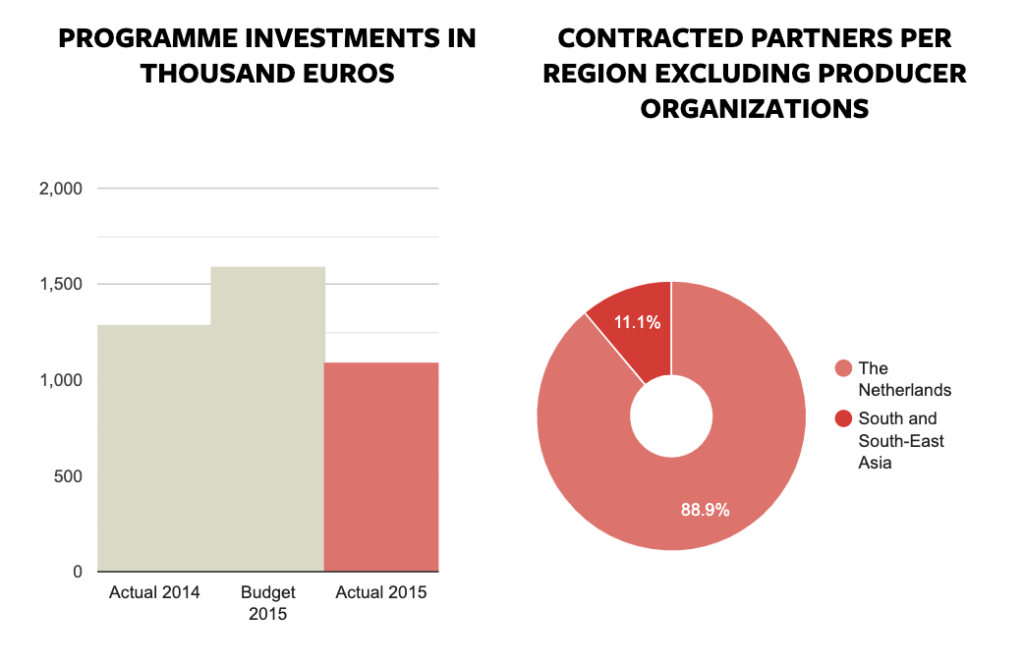
PARTNERSHIPS
Key partners are trading companies servicing the European market, such as Seafood Connection, Primstar and SeaCorin, and processing factories in Asia. The Dutch government remains a key donor, although it increasingly favours smaller, targeted initiatives.
New partners are input (technology) suppliers and feed companies. For example, we are looking for an opportunity to pilot high-quality fingerling production for smallholders in Myanmar with Til-Aqua and Coppens.
In Bangladesh, we attempted to continue certified organic black-tiger shrimp production with Seafood Connection, but we believe the internal management requirements, as well as certain principles in the standard, are prohibitive for smallholders farmers – particularly in respect of the costs, management complexity and lack of added value.
Both the second phase of the food security programme in Bangladesh and the upcoming Myanmar Sustainable Aquaculture Programme (MYSAP) are expected to become platforms for innovative pilots that engage producers, input suppliers and buyers. These innovations strive to solve problems on the supply side in areas such as productivity, quality and sustainability, as well as challenges on the market side relating to access and positioning, in ways that benefit smallholders. Partners are Wageningen University, Deltares and Pur Projet.
A shrimp pilot focusing on good practices was launched in West Bengal, India with IFB Agro. In 2016, we expect to scale it up with support from the IDH FIT Fund.

CHALLENGES
With the increasing consolidation of retailers in Europe and the US around certification initiatives primarily designed for input and capital intensive farming systems, there is a serious risk of diverse and more sustainable approaches losing market access. For example, the 11,928 shrimp farmers supported by Solidaridad in Bangladesh face a double barrier: certification systems are too complex and costly, but it is difficult to position a non-certified product in retail stores that have committed to certified products. Yet these farmers produce high-quality shrimp with a very low footprint that merits a position in the market. They also happen to be among the poorest farmers and those most affected by climate change.
In 2016, we will pilot ASC Group Certification requirements with smallholder shrimp farmers in Bangladesh, hoping to reduce costs and complexity so that they benefit farmers. Looking beyond certification, we will try to set up pilots with farmers to improve water and sediment management of coastal polders, increase mangrove cover and improve shrimp productivity against low investment and operating costs, reducing climate change-related risks. The challenge is to create the most rewarding market for this comprehensive approach, which could potentially change the lives of 195,000 shrimp farmers and their communities in the densely populated polders of coastal Bangladesh.
INNOVATIVE YOUTH PROJECTS HELP COCOA THRIVE
Solidaridad aims to address the problem of low youth participation in the cocoa supply chain by combining business and life skills training for young entrepreneurs so they can maintain thriving cocoa farms and businesses.
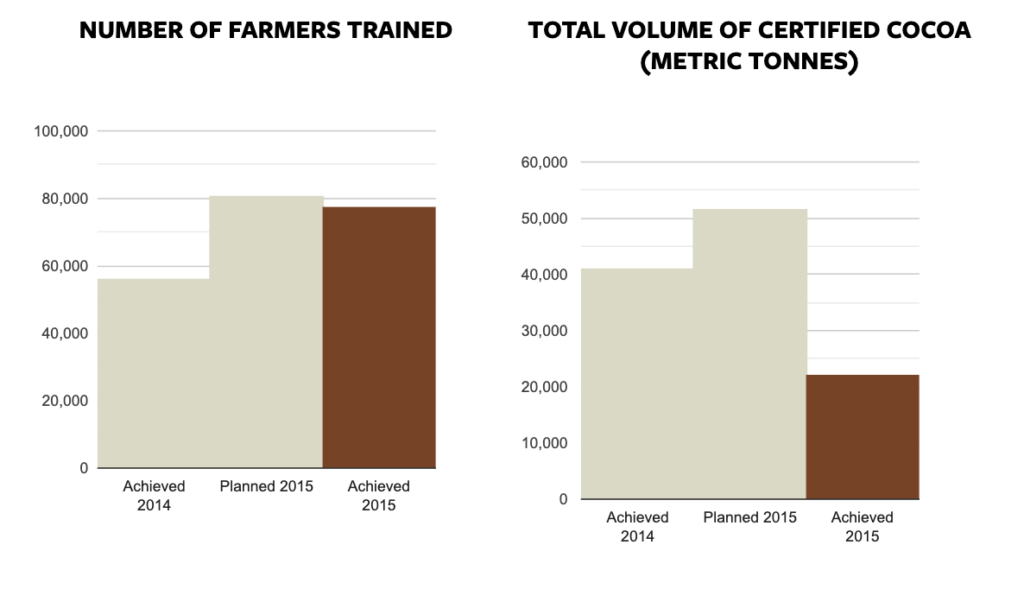
ACHIEVEMENTS
In Ghana, Solidaridad implemented a pilot curriculum for young people, funded by Unilever & ECOM Source Trust. The curriculum combines life skills and enterprise development for cocoa growing communities. Marks & Spencer and Barry Callebaut funded research into SME Development in the Cocoa Service Provision Sector in Ghana. The outcomes of these two innovations will be incorporated in the Next Generation Cocoa Youth Programme (MASO), funded by the MasterCard Foundation.
Cote d’Ivoire witnessed active engagements with CEMOI and Mondelez, culminating in the Cocoa Life project and additional funding from the Jacobs Foundation. In Brazil, Solidaridad and Cargill signed a technical agreement to promote supply chains in selected regions in the Amazon. In Guatemala, Solidaridad is implementing the Education, Leadership and Food Security programme for Q’eqchi girls and young women in the cocoa agro-ecosystem of the northern region.
Solidaridad has built a strategic approach that supports youth entrepreneurial and life skills development, leveraging its expertise across commodities and supply chain programmes.
The human-centred design approach has been piloted as an innovative tool for youth development. The landscape approach driven by cocoa supply chains in the Amazon has provided an innovative perspective for Brazil, while the rural service centre provides training, inputs and technical support, as well as demo plots incorporating integrated soil fertility management.
REGIONAL COMMODITY PROGRAMMES
Solidaridad partnered with local CSO Community Cloudforest Conservation (CCC) to expand its WALC programme for improving gender equity, food security and nutrition in cocoa farming families in Alta Verapaz, Guatemala, through women-centred agroecological education, leadership training and access to formal education.

Developing life skills is a powerful tool for strengthening the (self) employment prospects and employability of the next generation in cocoa growing communities. Young people can learn to set up and run a viable business in cocoa farming or work as an entrepreneur in a cocoa growing communities.

The Maso programme in Ghana, supported by the MasterCard Foundation, will train young cocoa farmers across eight districts in agricultural best practices, financial management and life skills. It will also prepare young entrepreneurs to establish cocoa-related enterprises and thus create more employment opportunities within the cocoa value chain. Solidaridad North America contributes oversight not only to the Maso programme but to the entire Youth Forward Initiative.

Brazil has made progress on an environmental framework and relevant commitments for low carbon agricultural policies as agreed at COP21 in 2015. However, in order to become a reality, these commitments need to bring together public-private and civil society partnerships. Solidaridad is taking on this role, engaging with the environmental public sector to structure an upscaling of the smallholder production model for zero-deforestation and forest code compliance.

Solidaridad West Africa continued to work with supply chain stakeholders and engage them in innovative solutions to improve production, processing and trade, ensuring a transition to a sustainable and inclusive economy that maximizes benefit for all. Solidaridad is implementing a number of cocoa programmes in partnership with private cocoa industry companies, government and other stakeholders in Cote d’Ivoire, Ghana and Nigeria.

DEVELOPMENTS
Global cocoa supply chain actors are investing in their own programmes and quality systems to secure sustainable cocoa supply as an output that goes beyond certification. Cocoa Action has been established by its 11 core members to sustain cocoa supply and improve the livelihoods of farmers in Côte d’Ivoire and Ghana. By 2020, Cocoa Action intends to train cocoa farmers and deliver improved planting material and fertilizer, as well as empower communities through education, guarding against child labour and raising the status of women.
Youth participation in the cocoa supply chain is minimal as the sector is not seen as economically and socially attractive. Producer countries increasingly view this as a threat to their future supply base. Governments have responded by prioritizing the active involvement of youth within the cocoa supply chain as service providers and producers. In Ghana, COCOBOD has initiated its youth in cocoa farming programme in a number of cocoa growing communities.
Because of bad weather and other setbacks, Ghana has been unable to meet its 1 million metric tonne project target. This has impacted supply chain actors within the region.
ICCO recognizes Guatemala as a fine cocoa supplier. Through the various partnerships, Solidaridad is harmonizing its programmes with the private sector and governments. Solidaridad is also working with Cocoa Action partners to support Ghana and Cote d’Ivoire’s national cocoa sustainability agenda.
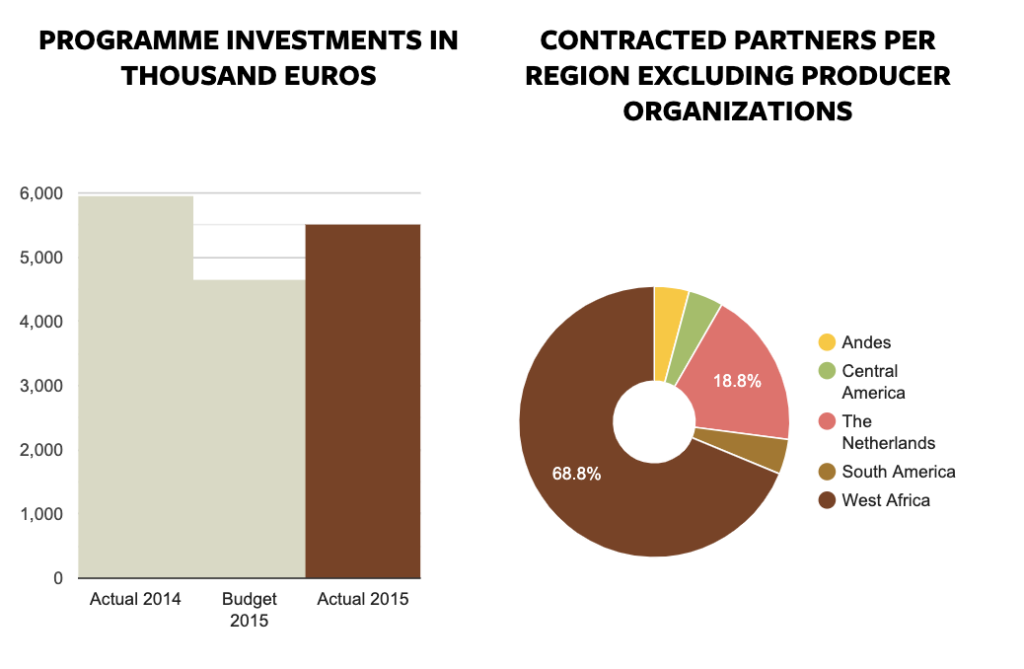
PARTNERSHIPS
In 2015, our partners included Cargill, Pará government, Novo Repartimento municipality, the National Institute of Land Reform and colonization in Brazil, Touton, Mondelez, Marks & Spencer, Unilever, Cargill, Barry Callebaut, ECOM, Mastercard Foundation, IDH, the Dutch Ministry of Foreign Affairs, the Government of Ghana and the Dutch embassy in Ghana. New strategic partners include the Government of Brazil, Unilever, Marks & Spencer, CEMOI, Mastercard Foundation, Ashesi University and Aflatoun.
We implemented a pilot project on youth life skills and entrepreneurship development in cocoa regions, research on small business opportunities in Ghana and other projects in West Africa, Brazil and Latin America. The outcomes of some of these interventions will be updated for the MASO project and shared with industry partners. Marks & Spencer is developing a new partnership with Solidaridad which is the first of its kind for a retailer. In Cote d’Ivoire, Solidaridad is implementing a three-year cocoa life project with Mondelez, which culminated in a joint effort to secure funding from the Jacobs Foundation. Solidaridad in Central America co-ordinated several meetings with stakeholders to discuss the National Strategy of Cocoa in Guatemala and partnered with CSOs such as SNV to provide technical assistance and training to associations in Nicaragua.
Knowledge development activities included:
- Cocoa Barometer 2015
- Research on small business development
- Impact evaluation of UTZ cocoa certification in Ghana
- Ghana Cocoa Platform study on Assessment of Environmental and Socio-Economic Impacts of Mining
- World Bank Scenario Planning Workshop on Ghana Cocoa Sector
- WCF research on Input Delivery Strategies and Recommendations
Solidaridad brought expertise to the following multi-stakeholder initiatives:
- ICCO Consultation Board
- Facilitated Forest, Agriculture and Climate Coalitions in Brazil
- Dutch Cocoa Working Group
- German cocoa platform (GISCO)
- CCE Curriculum
- VSS – UTZ Certified – improvement of the cocoa standard and implementation (UTZ advisory board)
- CEN/ISO process toward a new standard for sustainable cocoa

CHALLENGES
The general decline in cocoa productivity in Ghana was a major concern for key stakeholders in the supply chain. Solidaridad is using the implementation of the RSC model as an established basis for evidence-based innovation to ensure improved yields can be sustained in the future. As mainstream funding declines globally, the need to look for innovative ways of working with impact investors has become critical. There is also a lack of national and regional strategies by Central American governments to support the cocoa value chain.
Cocoa Action, a strategy framework aligned between the nine largest multinationals in the sector, is a welcome development. However, the number of farmers the plan is aiming to reach is a small fraction of all of the cocoa farmers in West Africa, many of whom are already being reached through current Cocoa Action members in their own programmes.
We will work strategically with governments to develop interventions in sustainable landscapes that integrate supply chain development, as well as inclusive sustainable landscape programmes, impact investments, youth development and improvements to livelihood in the cocoa industry in West Africa, Central and South America.
REDEFINING THE SUSTAINABILITY AND INVESTMENT AGENDA
Although the global coffee industry has invested considerably in the supply chain in the past year, coffee production is at risk. Climate change has taken a heavy toll on coffee farmers in particular. Solidaridad has been successful in building a business case for Climate Smart Agriculture in coffee producing countries. Public-private collaboration at the global and local level is required to scale up efforts and investments. By building on the certification efforts and going further, a shift to a continual improvement framework for sustainability based on performance rather than compliance is needed.
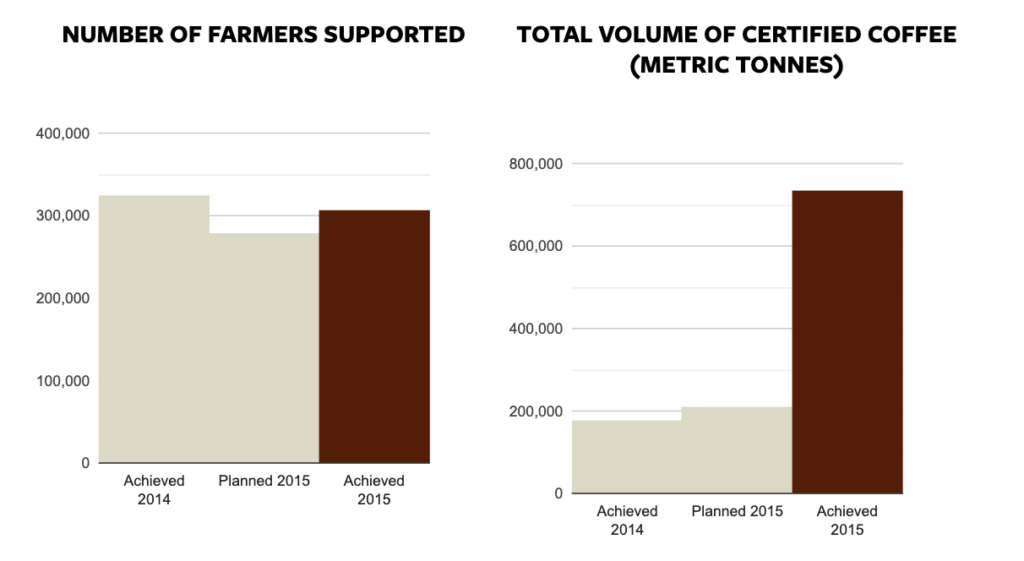
ACHIEVEMENTS
In 2015, Solidaridad made great strides toward implementing its Climate Smart Agriculture programme in Mexico, Colombia and Peru. Through the increase of coffee density, the introduction of climate resilient varieties, the increase of shade production and water balance, and the improvement of waste water and soil management, we have managed to combine increased and more stable productivity with a lower environmental footprint. There is now a promising proof of concept that other Latin American countries can replicate. By using the Cool Farm Tool, we have been able to monitor the environmental footprint of our pilot coffee farms before, during and after intervention.
In Ethiopia and Kenya, our coffee programme focused on enabling smallholders to become more productive and profitable by including a comprehensive food security component. in Tanzania and Uganda, we intensified our training programmes with farmers and extension field agents on Good Agricultural Practices (GAP) and Internal Management Systems (IMS).
Non-competitive collaboration in the Sustainable Trade Platform in Colombia has resulted in the development of specific tools to assess the costs and benefits of voluntary sustainability standards. Training materials have been aligned among different extension services. Content and approach have also been updated and the materials are now distributed digitally among a wider group of industry professionals, organizations and producers.
REGIONAL COMMODITY PROGRAMMES
After years of developing sector alliances, advising key coffee producing companies and sharing technical expertise, the Sustainable Trade Platform (STP) has contributed to the country becoming the global leader for sustainable coffee production (certified/verified volumes 57% vs. 40% global average).

The Back to REDD+ coffee project in Mexico validated a technological package to hasten renovation and rehabilitation of plantations decimated by leaf rust while also decreasing emissions, thereby restoring livelihoods to vulnerable smallholder families. Innovations in pruning, leaf rust resistant varieties, and intensification of production lead to more efficient agroforestry systems that can also address food security and help adapt to climate change.

Solidaridad East & Central Africa supported smallholder farmers in making their coffee production more sustainable while strengthening producer organizations, creating an enabling environment and enhancing environmental sustainability. This was accomplished in partnership with sector leaders, coffee traders, cooperatives and unions. Solidaridad also worked with coffee smallholder farmers to improve food crop production, economic resilience and livelihoods.

In the Netherlands, the volume of certified coffee on the Dutch market (UTZ, Rainforest, FairTrade or Organic) has stabilized at 50%. We are now seeing a new trend where roasters set up and invest in their coffee supply chain with tailor-made sustainability programmes, instead of increasing the traded volume of certified coffee. As the Dutch coffee sector is the most advanced in certification, similar trends are expected in other European countries.

DEVELOPMENTS
The global coffee market looks to be heading toward a minor supply deficit in the upcoming years. World consumption increased at an average rate of 2.5% in 2015, bringing the total to about 150 million bags. Demand is expected to reach 175 million bags in 2020. The main reasons for this slight deficit are climate events in large producer countries such as Brazil and Indonesia, the coffee rust outbreak combined with ageing plants in Central America/Peru, and productivity problems in East Africa. The imbalance between certified production and certified sold coffee is a clear threat for the current sustainability agenda.
The trend of company-specific sustainability policies confirms the need to reposition the common sustainability agenda in order to tackle challenges beyond certification. Solidaridad recognizes the role of certifications in generating impact, but we also welcome the shift within the sector to a framework that enhances continual improvement and is more impact driven. Key information on the externalities and true costs has to be made visible to all stakeholders in the supply chain.
With the increased pressure on land resources, a more sustainable solution is needed to produce more coffee per unit of land, water and agro-inputs. The global COP 21 agreement signed in 2015 offers the opportunity to incorporate a more inclusive approach within environmental policies in coffee producing countries. These global efforts need the support of public and private stakeholders at the local level in order to formulate effective policies for coffee farmers.
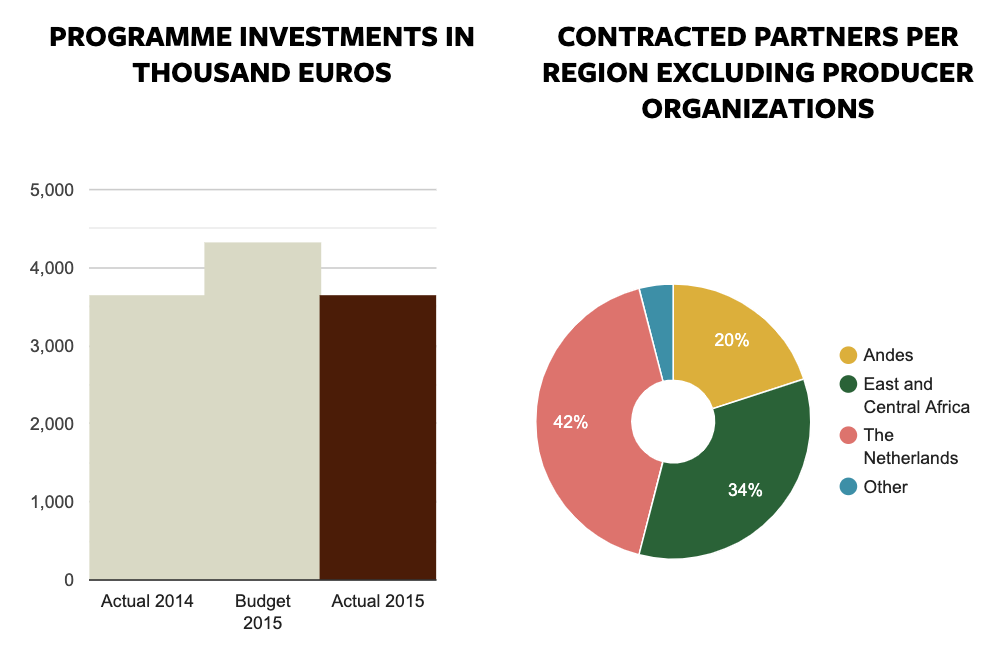
PARTNERSHIPS
In 2015, Solidaridad became one of the co-founders and board members of the Sustainable Coffee Challenge (SCC). The SCC was established with the aim of making coffee the world’s first sustainable agricultural product. It complements current sustainability initiatives at the global level and will build consensus among the major market players to scale up sustainable sourcing. The SCC will also strive to leverage investments at the farm level. In particular, there is much potential for the SCC to act as a convening platform to link the efforts of major North American players to the national platforms that have been or are being developed in Latin America. In addition to this, Solidaridad has become a member of the Sustainable Agriculture, Food and Environment (SAFE) alliance, co-founded by private companies, donors and NGOs in Latin America.
In Mexico, Honduras, Guatemala, Nicaragua and Peru, we have worked closely with UTZ, 4C, Fairtrade and Rainforest Alliance and the Sustainable Commodity Assistance Network to carry out a thorough analysis of the sector. The study aimed to identify the need and opportunities for non-competitive collaboration between public and private partners in the fields of good practice, robust infrastructure and enabling policies.
Solidaridad has also intensified its collaboration with companies such as Nestlé, OLAM, Volcafé and Louis Dreyfus; donors including NORAD, the Dutch Ministry of Foreign Affairs, Irish Aid, IDB; knowledge institutions such as CENICAFE and Tanzania Coffee Research Institute; and producer organizations such as FNC, JNC and the Ethiopian Coffee Unions.

CHALLENGES
Thanks to the establishment of more private extension services, we have been able to reach an increasing number of smallholders, but technical assistance remains limited. The use of (mobile) tools and trainings can increase the scale and effectiveness of technical support to smallholders to widen the implementation of good agricultural practices.
The Climate Smart Agriculture agenda will need to be accelerated and better funded to enable smallholders to adapt to current and future impacts of climate change, while providing additional revenue streams at the farm and landscape level. Solidaridad has been able to build a solid business case for Climate Smart Agriculture, combining higher productivity with a lower environmental impact. New investment models will be developed with key partners to attract a mix of funding opportunities.
Solidaridad has gained crucial insights through its facilitating role in the sector platform in Latin America, but producers are under-represented in global and national platforms. We will work to build up the capacity of local producer organizations and CSOs enabling them to advocate for their interests during the development and implementation of policy at the national and local level.
COTTON’S SUSTAINABLE NETWORKS
Amid a challenging global context, Solidaridad’s cotton programme has been consolidated in nine key production countries (China, India, Kenya, Uganda, Zambia, Mozambique, Senegal, Mali and Ghana), while also expanding to Ethiopia and South Africa. These last two countries offer new perspectives with the possibility to connect with the growing textiles industry in Ethiopia and domestic brands and retailers in South Africa.
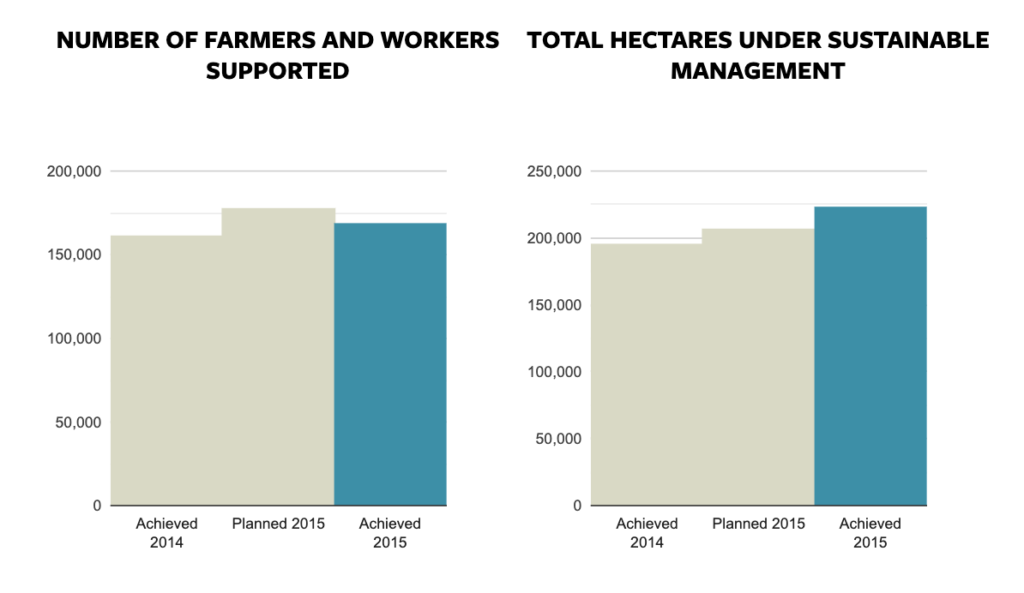
ACHIEVEMENTS
In India, the focus continued to be on promoting good agricultural practices, in particular with regards to water conservation and soil management within the framework of the Better Cotton Initiative standard.
The Southern Africa Partnership for Sustainable Cotton and Food Security (SAPSCAF) project has gained momentum in scaling up both in Zambia (8,112 farmers) and Mozambique (8,867 farmers).
In Ethiopia, while we conducted a scoping study to better understand the sustainability situation of the cotton sector, we partnered with PAN Ethiopia and started working toward organic cotton production for the first year with smallholders and two large farms.
At the policy level, 2015 has seen some notable successes. For example, Solidaridad is building on a successful two-year pilot project aimed at introducing smart and sustainable land use planning for soy and cotton production in northern Ghana. Solidaridad has also been invited to partner with the newly established governmental Cotton Development Authority to develop a national strategy for reviving the cotton sector in Ghana.
REGIONAL COMMODITY PROGRAMMES
From just a small organic project in Tanzania in 2011, Solidaridad has grown its cotton portfolio to include Uganda, Kenya and Ethiopia. By the close of the year, a total of 10,800 smallholders had been reached. Sustainable production principles have since been entrenched in the national cotton policies through working with leading organizations like TechnoServe, Uganda, Fibre Crops Directorate – Kenya and Ethiopian Cotton Producers, Ginners and Exporters Association and H&M.

While the growth in production of more sustainable cotton is eminent, the uptake by retailers and brands is lagging behind. During 2015, Solidaridad raised awareness in the cotton and textile sectors to ensure sourcing is aligned with production.

Solidaridad partnered with the Walmart Foundation to build upon a Better Cotton Initiative (BCI) training programme in China to address the needs of women farmers; primarily in leadership development and community mobilization. The project increased the participation of women in Solidaridad China’s ongoing BCI projects by 45%.

Projects being implemented at Solidaridad South & South-East Asia cover a variety of agro-climatic and socio-economic conditions. Partner experiences in implementing Better Cotton projects provide a rich source of knowledge that can inform future strategies for implementing farm-based interventions with smallholder cotton farmers.

Although the current drought in Southern Africa has a negative effect on the production of cotton, Solidaridad and its partners are expanding Better Cotton production to South Africa. In Mozambique, the focus is now on increasing yields by grouping farmers in clusters with better support systems.

DEVELOPMENTS
Cotton farming contributes to the livelihoods of millions of people in about 80 countries across the world. Production is dominated by India and China who harvest about 50% of the world’s cotton each year. Cotton remains, however, a key cash crop for smallholder farmers elsewhere, especially in Africa.
The year in review (2015) has been a tough year for the cotton sector with world cotton production estimated to decline by 15% compared to the previous season. Globally, cotton planted area decreased by 8% because low cotton prices discouraged farmers from planting cotton. In many countries, in particular in East and Southern Africa, adverse weather conditions also led to yields decreasing by 7% worldwide.
The topic of sustainability in the cotton sector continued to gain momentum, notably with the publication of a promising framework for Measuring Sustainability in Cotton Farming Systems. The supply of sustainable cotton has also been estimated to have reached an all-time high, passing the symbolic bar of 10% of world production. On the demand side, leading companies like H&M continued to demonstrate a strong commitment to increasing their use of sustainable cotton.
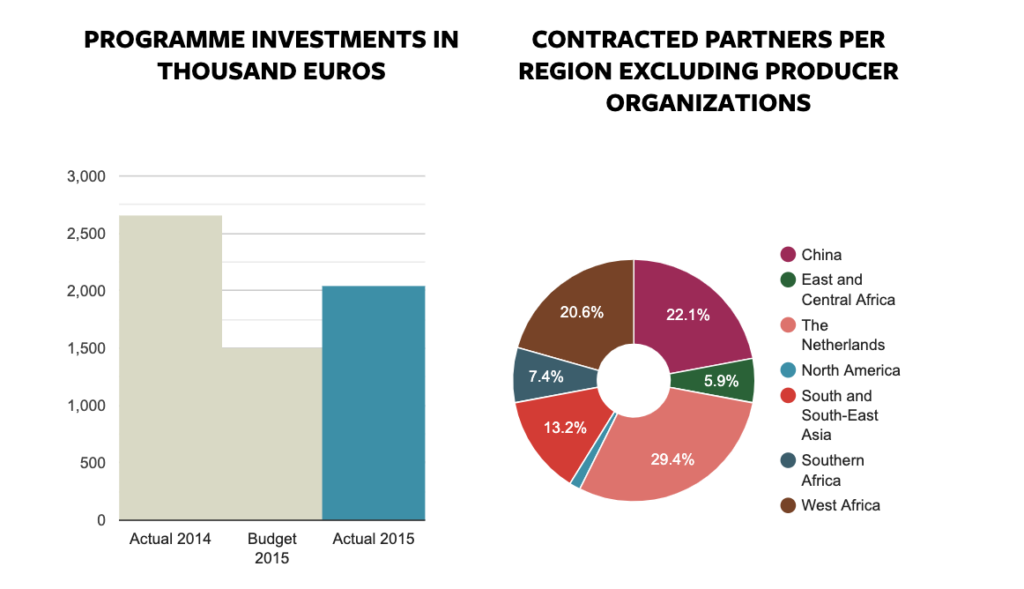
PARTNERSHIPS
In 2015, Solidaridad partnered with a variety of organizations in the cotton supply chain and sector at large, including:
- Cotton producer organizations
- Cotton ginning and trading companies
- Government cotton authorities
- Non-governmental organizations
- Retailers and brands
We also remained an active member of the Better Cotton Initiative and in dialogue with other relevant sector sustainability organizations.
For example, in our Better Cotton project in the province of Hebei, China, we partnered not only with the Bureau of Agriculture of the Ju-Lu County to train smallholders and a large farm (Baoding Shuofeng Agri-products Co. Ltd), but also with a spinning mill (Hebei Xindadong Textiles Printing & Dying Co. Ltd) and VF Corporation to ensure uptake of the cotton produced.
Solidaridad’s funding partners in 2015 included:
- Dutch National Bank (De Nederlandsche Bank, DNB)
- Dioraphte Foundation
- GSRD Foundation
- Walmart foundation
- Better Cotton Fast Track Programme
- Rabobank foundation
- Solidaridad Farmer Support Program (co-funded by the Public-Private Partnership facility DGIS of the Dutch Ministry of Foreign Affairs)
- The Netherlands Enterprise Agency (Rijksdienst voor Ondernemend Nederland, RVO) of the Dutch Ministry of Economic Affairs

CHALLENGES
Global cotton prices remain low as the 2016/17 season starts. In this context, it remains even more crucial to keep putting farmers at the centre of the programme, while working toward mainstreaming sustainability in the cotton sector. This requires both locally adapted solutions to the many different contexts in which cotton is grown as well as increased motivation to build market recognition for the efforts of farmers who are producing cotton sustainably.
In 2016, Solidaridad will be working at both ends of the supply chain to connect sustainable cotton farmers with off-takers in our field projects, while also encouraging brands and retailers to increase their uptake of sustainable cotton.
THINKING LOCALLY BRINGS THE GLOBAL MARKET CLOSER TO HOME
Strengthening food production and distribution systems for local markets is becoming increasingly important. Solidaridad is developing a portfolio of food security-related projects, including fruit and vegetables in Bangladesh, Kenya, Ethiopia, South Africa, Mozambique and Ghana. In some cases, export crops are an enabler for farmers to improve their food crops. The food security programme in Kenya and Ethiopia, with Nestlé and Ecom as contributing partners, is an example of this approach, which aims to reach 120,000 farmers.
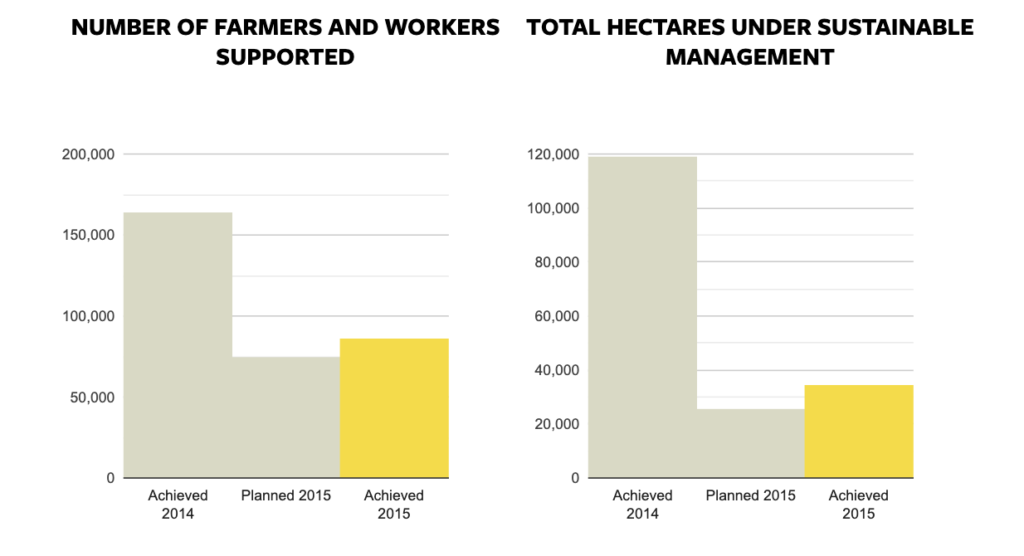
ACHIEVEMENTS
FRUIT JUICE
A coalition has been formed with the major players in the Brazilian fruit juice sector for working toward sustainable citrus production. The initiative started as a collaboration between Solidaridad and Friesland Campina Riedel. Together with the producers’ cooperative Citri, the self-assessment tool Rural Horizons was adapted for citrus production. Sector engagement with brands on the market side and farmers and producers on the supply side led to the development of a plan to support 4,400 farmers who produce 10% of the world’s orange juice. Solidaridad has also launched programmes in India and South Africa.
BANANAS
Solidaridad is involved in the steering and governance of the World Banana Forum. The WBF is a community of change that aims to improve the sustainability of the sector. Solidaridad is leading a programme to improve health and safety in banana production in Ecuador and Cameroon, in partnership with WBF, banana companies and retailers. We also played a leading role in developing national sector platforms in Peru and Colombia. Solidaridad is working to prevent the spread of Panama disease, particularly in Colombia.
HORTICULTURE FOR FOOD SECURITY
New projects have been developed in Kenya, Mozambique and South Africa, while the implementation of existing programmes in Bangladesh, Ethiopia, Kenya and Ghana has continued. The programme in Bangladesh has reached more than 20,000 horticulture farmers, 70% of whom adopted new technologies. Yields increased by 10% to 30%, while farm incomes increased by 16% on average.
The banana sector platform supported by Solidaridad is bringing workable solutions to the widespread problem of plastic contamination in the Chira valley. This is necessary due to the absence of a suitable system for the disposal of the millions of plastic bags used to protect the banana bunches. A private initiative is now recycling 20% of the plastic waste. Its ambition is to recycle 50% of all plastics used in the banana region by next year.

Solidaridad East & Central Africa has worked on innovations to support farmers in improving fruit and vegetable (F&V) production by targeting greater diversity, food safety and reduced food loss. The interventions such as market linkages and certification have improved the availability of healthy products and linking farmers to premium and sustainable markets. Concerted efforts have been placed on improved access and influencing policies that affect safe food both at local and regional level.

In 2014 Solidaridad and FrieslandCampina Riedel launched a programme in Brazil to promote sustainability throughout the orange sector. Besides field activities, one of the main priorities was to engage all relevant sector players. Two years later, the first concrete step towards a sector-wide coalition has been taken with the development of a proposal to support 4400 producers in Brazil to move towards more sustainable production. Together they represent between 15 and 20% of orange concentrate production globally.

The implementation of Solidaridad’s five-year project with Friesland Campina in the main citrus production area in Brazil aims at reducing the ever increasing number of small producers leaving the business due to the sector’s crisis. A sustainable approach to orange production will not only reduce liabilities from a social, economic and environmental standpoint, but also improve the quality of life of people working in this field.

Solidaridad’s horticulture programme was formally established in January 2015 and a sector strategy was completed by October 2015 in line with the global multi-annual strategic plan. The overall focus of the strategy is to assist in the upskilling and commercialization of smallholder producers in the horticulture sector in Southern Africa. Solidaridad seeks to improve local and regional market integration and coordination along the horticulture value chain.

DEVELOPMENTS
FRUIT JUICE
Sustainability is becoming more prominent on the agenda of the sector. New initiatives are gaining momentum. Solidaridad has played a pivotal role in this through our partnership with Friesland Campina Riedel. Close collaboration with a front-running company has proven to be an effective strategy, enabling Solidaridad to develop a coalition of leading companies with a stake in the Brazilian fruit juice sector to work on sustainable citrus farming.
BANANAS
The global banana business is characterized by single variety monocropping. The sector is currently struggling with the threat of Panama disease, Tropical Race 4 (TR4). The TR4 fungus has severely damaged banana plantations in South-East Asia. Recently, it has reportedly spread beyond Asia to Mozambique and Jordan. This type of fungus infects the Cavendish banana varieties, which dominate global trade but are also important for domestic markets and other cultivars used for local consumption and marketing. It has been historically proven that the Panama disease can significantly affect livelihoods and food security by reducing productivity, income, employment and government revenues in many tropical countries. Solidaridad is working closely with the World Banana Forum to address these challenges.
HORTICULTURE FOR FOOD SECURITY
Fruit and vegetable consumption in developing countries is growing much faster than in developed countries due to population growth and increased consumption per capita. The rise in demand is mainly from the growing cities. Production for national markets is increasing, but cannot always keep up with the pace of demand growth.
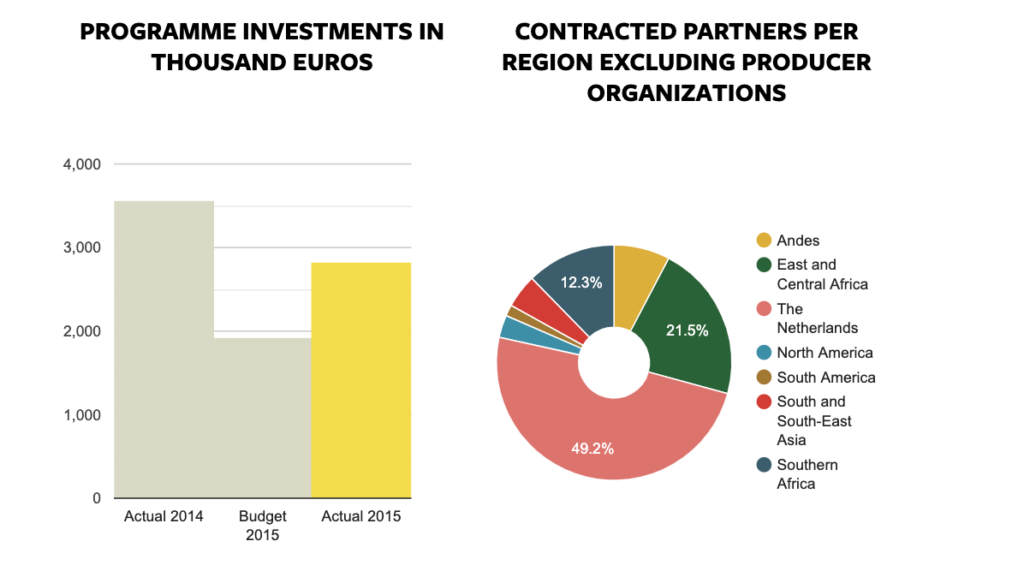
Actual 2014Budget2015Actual 201501,0002,0003,0004,000
| Actual 2014 | € 3,559 |
| Budget 2015 | € 1,913 |
| Actual 2015 | € 2,825 |
CONTRACTED PARTNERS PER REGION EXCLUDING PRODUCER ORGANIZATIONS
AndesEast andCentral AfricaTheNetherlandsNorth AmericaSouth AmericaSouth andSouth-EastAsiaSouthernAfrica21.5%12.3%49.2%Southern Africa8 (12.3%)
| Andes | 5 |
| East and Central Africa | 14 |
| The Netherlands | 32 |
| North America | 2 |
| South America | 1 |
| South and South-East Asia | 3 |
| Southern Africa | 8 |
PARTNERSHIPS
FRUIT JUICE
Our partnership with Friesland Campina Riedel (FCR) has been very successful, allowing us to develop the collaboration with SAI platform and with the European Fruit Juice Association AIJN. Leading global brands such as Coca Cola and Pepsi are now collaborating to roll out our initiative in Brazil.
BANANAS
Through the World Banana Forum, we are collaborating with leading producer companies such as Chiquita, Dole and Fyffes as well as retailers like Tesco and Asda, who are partners in our health and safety initiative for the banana sector. IDH is co-funding this programme. We are also working with the Ecuadorian government to develop a national curriculum for health and safety in the sector.
HORTICULTURE FOR FOOD SECURITY
Nestlé is an important contributing partner in the food security programme in Kenya and Ethiopia. The programme works with farmers who grow coffee as their main cash crop and has huge potential for improving their production for the local market. There are also important partners at the local level in these programmes, such as in Bangladesh, where we are collaborating with ACI Seed Ltd and the Department of Agricultural Extension to develop the tomato supply chain. In South Africa, we initiated collaboration with the Spar retail chain. Funding for the horticulture for food security programmes is provided by Dutch embassies in Bangladesh and Ghana and by the Netherlands Enterprise Agency (RVO) for Kenya and Ethiopia.

CHALLENGES
In general, fruit and vegetable production and supply chains focused on local markets are less formal, smaller in size, more fragmented and less efficient than production focused on exports. Phytosanitary regulations and controls are often very limited, exposing consumers to health risks. Post-harvest losses are huge because of a lack of infrastructure, limited knowledge and weak organization in the chain.
Each subsector in each country has its own challenges. The Peruvian banana sector has issues with water supply and soil deterioration, while in Ecuador the sector is facing the consequences of the use of pesticides. Orange growers in Brazil have to comply with strict Brazilian laws while also preventing and combatting Greening disease in a sustainable way. Small horticulture farmers in countries such as Kenya and Bangladesh are struggling to survive.
The challenge for Solidaridad is to work toward systemic change in selected subsectors in targeted countries. We aim to work on the level of national subsectors while having boots on the ground in specific projects. Collaboration with international businesses will support developments at the national level. Brazilian experiences with the citrus sector are a good example of the potential of such an approach. Solidaridad will also strengthen its collaboration with the agro-input sector. Companies that provide seeds, fertilizers and disease control solutions can potentially make a great contribution to the solutions we are working toward.
EXPANDED PROGRAMME BRINGS BETTER PROSPECTS FOR SMALL-SCALE MINERS
In 2015, Solidaridad received the results of four external evaluations from the first five years of its programme implementation in small and medium-sized gold mines. The lessons learned were valuable for Solidaridad and its partners, especially since 2015 marked the kick-off of our five-year strategic plan (2016-2020) as well as the start of three new projects and the extension of an ongoing project. This new work aims to extend responsible practices to at least 30 new mines.
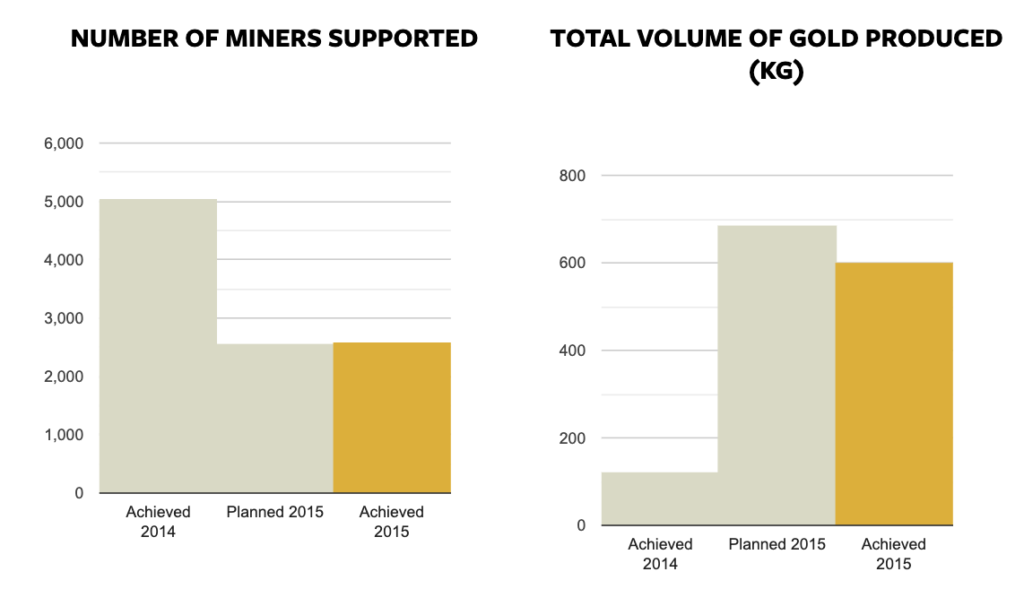
ACHIEVEMENTS
Solidaridad launched three new projects in 2015 with the goal of adding up to 30 mining associations to its network by 2020. This increase would double the size of our miner support programme.
These include:
- A five-year project to expand our producer support to 30 new artisanal and small-scale mines (ASM) in Ghana and Tanzania
- A four-year project to support and increase knowledge on good mining practices among lawmakers and other stakeholders in the Andes region
- A five and a half-year project to work with Dutch and European governments to develop policies and incentives for sourcing responsible mining and traceable gold
- The Dutch “Going for Gold” campaign, with support from Olympic gold medallists, to increase public awareness of the need for responsible gold
In addition, Solidaridad and its partner Fairtrade Foundation secured funding for the second phase of our successful ongoing support of ASM mines in Kenya, Tanzania and Uganda.
Solidaridad’s work in mining communities was the subject of four external evaluations that covered our work in Peru, Ghana, Tanzania, Kenya, Uganda and Europe. Highlights include:
- Mercury use fell from 38% to zero among an association of ASM miners on the concession of our partner mine, Minera Yanaquihua, in Peru.
- Our projects improved health conditions in ASM mining communities in Peru, Ghana, Kenya, Uganda and Tanzania.
- Production increased in mines that committed to sustainable practices in our programme in East Africa, making the mines more resilient to price fluctuations.
Solidaridad’s new five-year strategic plan aims to increase the volume of responsible gold available in the market to 125 tonnes by 2020.
REGIONAL COMMODITY PROGRAMMES
Solidaridad seeks to reinforce new policy development in Colombia, and to capitalize on a growing interest in Bolivia for the formalization process. That’s why Solidaridad has created a knowledge platform for learning and sharing research design and results about solutions to issues relating to Latin American artisanal and small-scale mining. These solutions will be tailored to each country’s legal status and progress.

Transformation to a safe and responsible artisanal and small-scale mining industry with the potential to reduce pollution will not be realized in isolation. Concerted efforts associated with the best possible practices for biodiversity management are required to provide access to capital, technical assistance and capacity building to improve practices that help the community access international markets for differentiated gold, and encourage a better policy environment.

In 2015 Solidaridad took the lead in establishing a new responsible gold dialogue in the Netherlands, in collaboration with the Ministry of Foreign Affairs, private sector actors and other civil society organizations. The aim is to secure concrete commitments for improving the gold value chain. We also launched the Going for Gold campaign in collaboration with the Dutch Postcode Lottery. We enlisted a team of Olympic medallists to reflect on winning gold, both for themselves and for small-scale miners in Africa.

DEVELOPMENTS
Instability in the price of gold caused mines worldwide to scale back in 2015. Boom-and-bust cycles are common in mining communities. Workers in small mines are especially vulnerable to downturns, which makes our work to help small mines access a value-added market and plan for the future even more vital.
The European Union is expected to pass a new regulation in 2016 to increase the number of companies that trace their sources of conflict minerals, including gold. Despite a 2,000% increase between 2012 and 2015 in the number of licensed fairtrade buyers, the amount of certified gold on the market remains small. Prices are high because demand exceeds supply. There is an urgent need to upscale responsible sourcing programmes to meet the demand created by the new EU rules. Better public policy is needed to incentivize good practices. Companies can also contribute to this by investing in improvements for their supply chains.
International dialogue is focused on conflict minerals, which originate from several high risk countries. Meanwhile, ASM mining is going on in nearly 80 countries and many mines face serious social and environmental challenges. Attention on the conflict countries must be matched with work in more stable countries so that the sector can support more miners even faster while creating economies of scale.
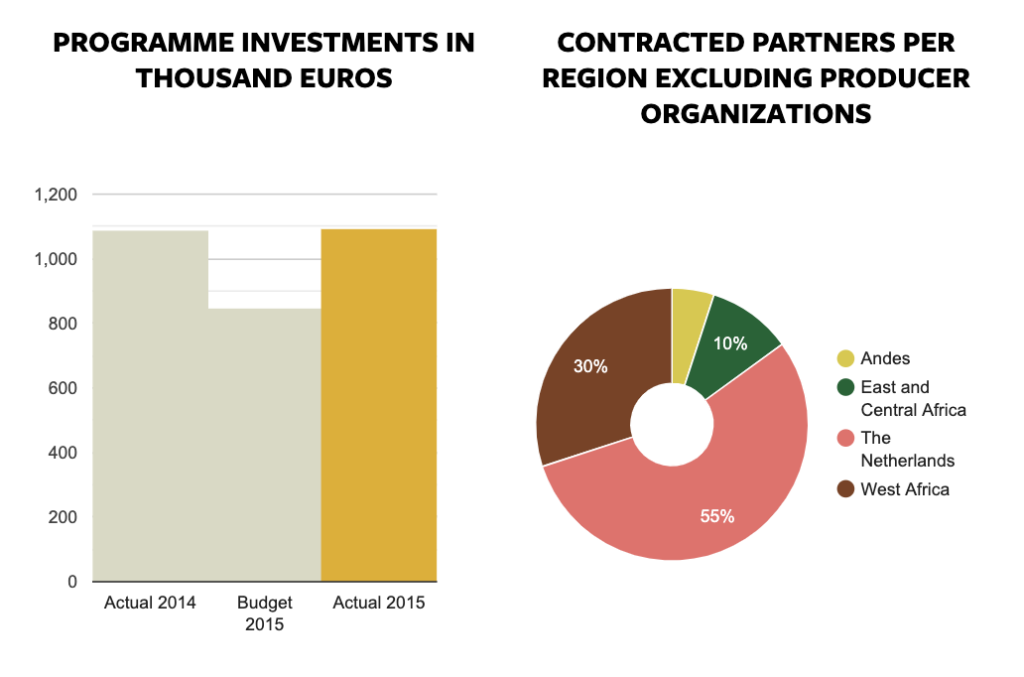
PARTNERSHIPS
Solidaridad entered a new coalition partnership in 2015 with Dutch organizations Simavi and Healthy Entrepreneurs. This five-year project, funded by the Dutch government, aims to empower women in mining communities in Ghana and Tanzania by working with up to 30 small-scale mines. Simavi will work in the surrounding communities to improve health and sanitation. Healthy Entrepreneurs will enable women to start their own businesses selling high-quality, low-cost health products and increasing awareness of proper health practices.This partnership is important because women typically experience the biggest negative impacts from mining while being denied equal access to the benefits.
Solidaridad is also starting a partnership with the Dutch government for “dialogue and dissent” in Dutch and European policy. This is the continuation of our work in early 2015 to help the Dutch government and private sector gold buyers establish a roundtable for responsible mining in the Netherlands which was attended by over 100 stakeholders. Solidaridad is also participating in new international public-private partnerships create the potential for better cross-sectoral cooperation and new partnerships.
Solidaridad has continued its close work with certification bodies Alliance for Responsible Mining (ARM), Fairtrade International (Fairtrade) and the Responsible Jewellery Council (RJC Code of Practices).
RJC highlighted the successes of Solidaridad’s partnership with Peruvian mining company Minera Yanaquihua in its 2015 Impacts Report.

CHALLENGES
Falling gold prices meant that mineworkers who had been trained in Solidaridad’s programme left mining by choice or were laid off. In a couple of cases, mines suspended operations and our future work with them is uncertain. We need to plan better for the likelihood that some mines will not be able to continue as partners. In addition, we will enable mines to be more resilient to market downturns, for instance by managing cash flow and savings more effectively.
Beyond the mines themselves, better systems are needed to transform the sector and upscale successful pilot projects. Policymakers need to adopt the right balance between controls and incentives for good practice. Gold buyers have yet to embrace broader cooperation, for instance between jewellery, electronics and financial companies. At the market end, the volume of responsibly produced gold available to buyers remains low and is not consistent. This is limiting uptake, particularly among large gold buyers and leading brands that often demand minimum volumes and reliable supply before they will commit to responsible gold.
Because of the need for greater cooperation, Solidaridad is helping to organize dialogues with the Dutch and European governments as well as a range of gold buyers. Solidaridad also secured funding to develop a knowledge-sharing platform in the Andes region.
Small and medium-size mines that have committed to better practices urgently need investment. Grants-based assistance is typically limited in time and can lead to dependency. It is therefore important to match initial grants with access to appropriate investment such as debt or equity financing. In this way, mines that commit to better practices have access to funding for their continued improvement once grants-based assistance is phased out.
SUSTAINABLE LIVESTOCK HOLD KEY TO CUTTING EMISSIONS
The UN Climate Change Conference in November 2015 put the spotlight even more firmly on sustainability in the livestock sector, which is responsible for about 15% of global greenhouse gas emissions. Within the industry, there is considerable potential to reduce emissions, particularly by low-yielding smallholder producers in the global South. There are social implications too, with more than 1.3 billion people around the world dependent for their livelihoods on livestock production.
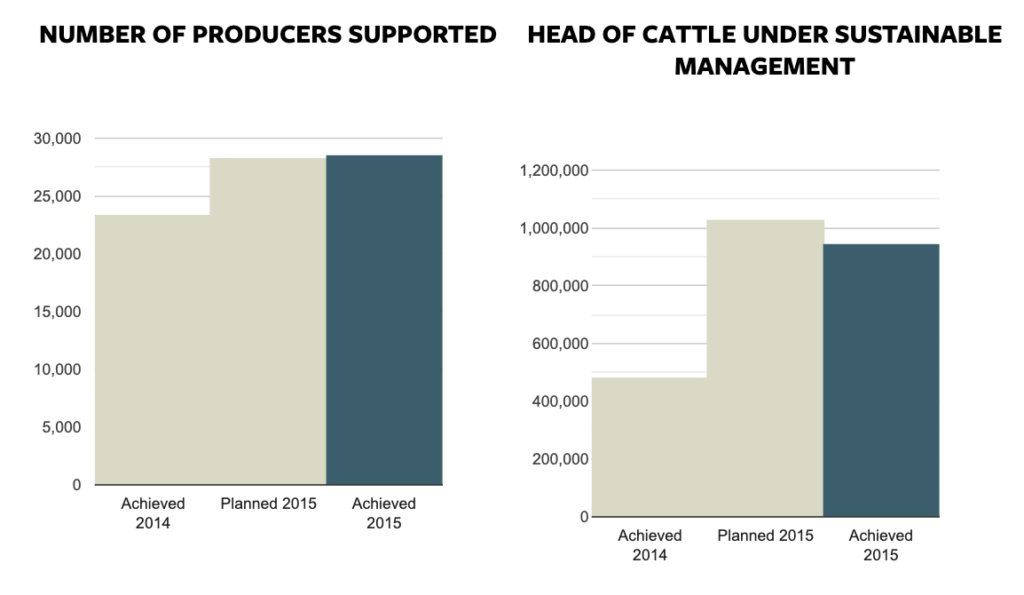
ACHIEVEMENTS
In Solidaridad’s largest dairy project in south-west Bangladesh, around 17,325 smallholder dairy farmers were supported with an integrated approach, 87% of whom were women. Initiatives ranged from improved fodder management to better marketing. The overall objectives are to support farmers in becoming effective agricultural entrepreneurs and to build safe food supply chains. The first results have already emerged: the average amount of milk produced per cow increased by 30%, strategic partner and dairy company BRAC Dairy built milk collection centres to source milk from the region, and farmers developed new businesses to exploit opportunities such as commercial fodder production.
Solidaridad started working in livestock in Kenya in 2013 using a field-to-fork approach and creating a public-private partnership between Loita Maasai Project Plains Fed Beef and the largest slaughterhouse in Nairobi. LMPPFB is a producer organization which was set up by Maasai pastoralists with support from the local government. In the programme, about 60,000ha has been brought under sustainable pasture management. An integrated approach allowed improvements to be made at every stage of the chain, from superior breeds to improved veterinary services, better marketing and use of waste for biogas in the slaughterhouse. In 2015, the main stakeholders in the Kenyan beef sector were brought together by Solidaridad as a first step to creating a National Sustainable Beef Round Table.
REGIONAL COMMODITY PROGRAMMES
- CENTRAL AMERICA
- EAST & CENTRAL AFRICA
- THE NETHERLANDS
- NORTH AMERICA
- SOUTH AMERICA
- SOUTH & SOUTH-EAST ASIA
- SOUTHERN AFRICA
The Farmer Support Programme funded project in Nicaragua “Competitive beef and dairy through sustainable intensification and specialized market access – GANASOL” aimed to increase the competitiveness and income of small and medium cattle farmers in Nicaragua through implementation of good farm management practices. The goal is to facilitate sustainable livestock production and increased resilience to climate change, and improved market access for milk and meat products.

The livestock sector plays an important role in the region. A pilot project in Kenya was designed to address the challenges of livestock production by working with about 6,000 pastoralists. The project has been able to improve capacity and organizational development, animal health, breeding, disease control, pasture management and market access. The herders form one business unit and supply live cows directly to the slaughterhouse with a ready market in Nairobi city.

As Solidaridad’s livestock programme takes shape, cooperation with the private sector in livestock has slowly been developing. The recent increase in dairy production in Europe has made European companies more focused on exports and less on local sourcing or smallholder support. In beef, the role of European companies is much smaller.

The Gran Chaco Americano in South America, one of the world’s most important and biodiverse biomes, is under threat due to unabated deforestation, driven mainly by livestock and soy production. Supported by the Gordon and Betty Moore Foundation and the Earth Innovation Institute, Solidaridad developed strategies to address this critical issue.

Cattle ranching is one of the main productive activities in the region, but sustainability has only been recently introduced into the sector’s agenda as a result of environmental laws. With the definition of the Global Round Table of Sustainable Beef (GRSB) principles and criteria, Solidaridad is now advancing towards building the first environmental risk-free supply chains in the region.

Solidaridad has implemented the Sustainable Agriculture, Food Security and Linkages (SaFaL) project in five south western districts of Bangladesh. In many ways, the SaFaL project is contributing to the adaptive capacity of its beneficiaries through economic development and decrease of climatic exposure and sensitivity of agricultural, dairy and aquaculture products using an improved ecosystem-based approach.

The year 2015 saw livestock continue its journey as one of the important focus commodities for Solidaridad Southern Africa. Solidaridad continued managing the two Dutch government-funded Farmer Support Program (FSP) livestock projects that will conclude in early 2016, while also exploring opportunities for new interventions beyond the FSP.

DEVELOPMENTS
Solidaridad is now active in livestock improvements in 10 countries. Our programmes are leading the way in inclusive development both in the beef and the dairy sector. Stakeholders within the sectors are taking up this sustainability challenge at increasing rate. In 2015, the Global Roundtable for Sustainable Beef agreed on its principles and criteria for sustainable beef. Major companies in the dairy sector have formed the Dairy Sustainability Framework to harmonize sustainability initiatives. Solidaridad is building on the lessons learned from its existing programmes to extend its dairy activities to other countries in Africa, Asia and Latin America.
At the same time however, dairy surpluses in the global North are increasing and companies see exporting milk powder as a higher priority than investing additional resources in dairy development and local sourcing in the global South.
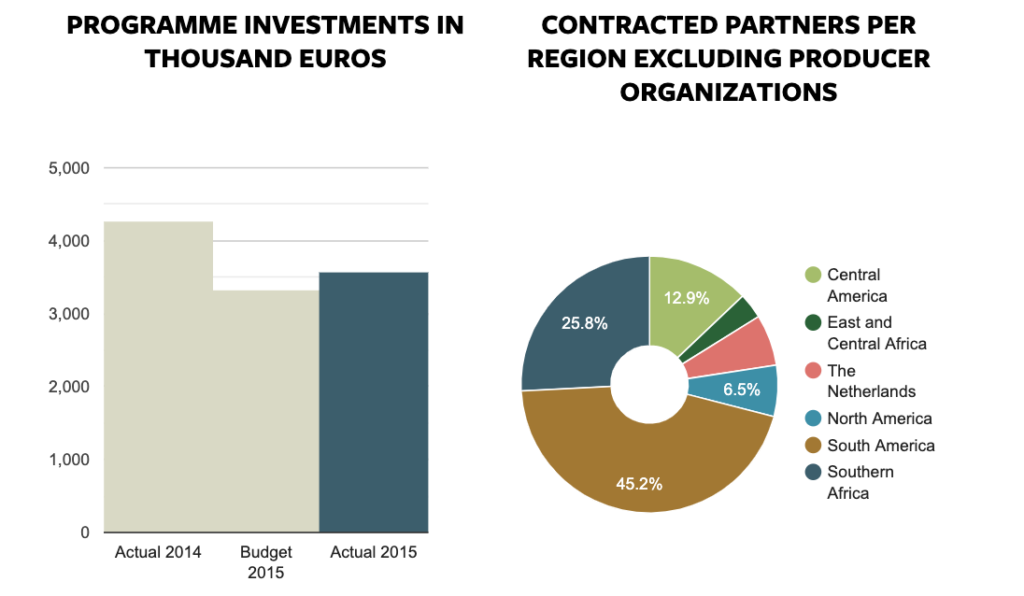
PARTNERSHIPS
Solidaridad is actively seeking cooperation with the private sector in the beef and in the dairy supply chains. In our experience, large companies in both dairy and beef are very reluctant to invest in schemes such as smallholder development, local sourcing and sustainability. Actual partners include MeatCo in Namibia and BRAC Dairy in Bangladesh. Other partners include the Asociación Rural del Paraguay, the country’s largest livestock producer organization, and Central American research institute CIAT.
For the beef sector, the Global Roundtable for Sustainable Beef has grown to 70 individual members and three affiliated national roundtable initiatives. Over the last couple of years, Solidaridad has worked closely together with the Brazilian Working Group on Sustainable Livestock (GTPS). In the dairy sector, Solidaridad is member of the Advisory Council of the GDAA Dairy Sustainability Framework, an industry initiative that is still in the early stages of development.

CHALLENGES
With 1.3 billion people worldwide directly or indirectly supported by the global livestock sector, there are huge opportunities to improve the lives of many millions of farmers and their families. At the same time, more efficient working practices can reduce the climate footprint of the sector. Kenya has more than 13 million cows, of which 90% are in the hands of smallholders. Many pastoralists, however, are being squeezed into smaller areas.
In addition, changing climate patterns have led to deteriorating access to water and accentuated the problem of overgrazing, which often leads to further impoverishment. As resource-poor livestock farmers tend to have very high greenhouse gas emission levels relative to output, smallholder development should go hand in hand with developing a climate smart livestock sector. This is the message that Solidaridad wants to promote in order to stimulate the global livestock sector to invest more in the development of the smallholder sector.
SMALLHOLDER INTERVENTIONS SHOW PALM OIL YIELDS TRIPLE IN WEST AFRICA
After three years of co-investment with farmers, Solidaridad’s SWAPP palm oil programme has reported a tripling of smallholder yields in Ghana. In China, the sustainable palm oil working group was launched to stimulate sustainable sourcing in one of the world’s biggest markets.
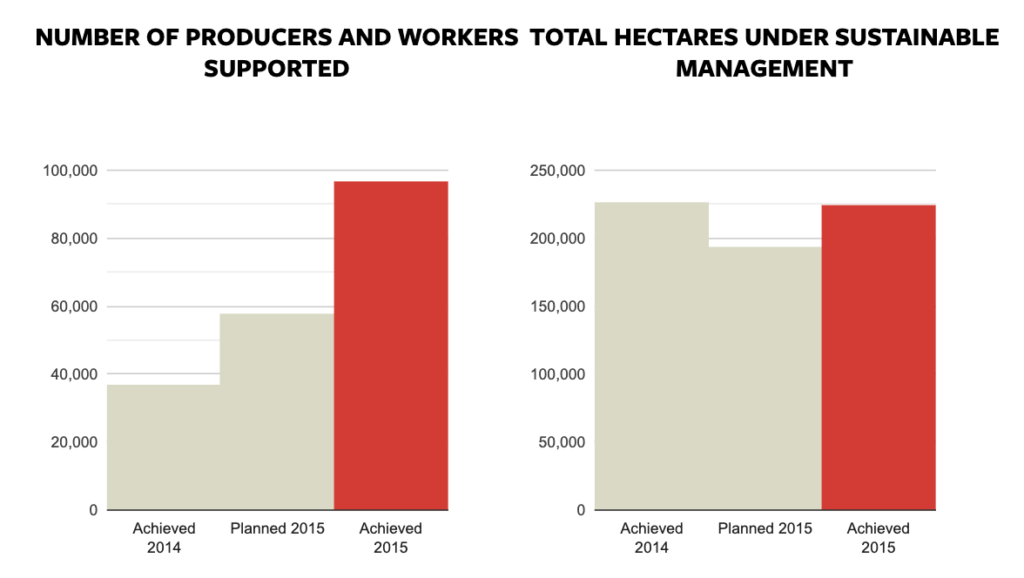
ACHIEVEMENTS
The China Working Group on Sustainable Palm Oil was launched in the wake of Dutch King Willem-Alexander’s state visit in October, in the presence of state-owned and private companies responsible for 70% of Chinese imports. In Indonesia, we provided quality agricultural inputs and training to over 2,500 independent farmers with RSPO member Asian Agri and Credit Union Keling Kumang. In Malaysia, we worked with palm oil trader Teik Joo Chan to provide training to its clients and pilot an RSPO-certified smallholder group of 34 farmers. In Colombia and Honduras, the nationwide Sustainable Trade Platform and the Sustainable Honduran Palm Oil Project (PASH) consortium were developed. In Brazil, Solidaridad’s farmer-first continual improvement system Rural Horizons was piloted with over 250 smallholders in an oil palm land-reform scheme with support from agri-business giant ADM.
Scientific trials conducted under the Sustainable West African Palm Oil Programme (SWAPP) revealed that applying Best Management Practice (BMP) on existing smallholder plantations can increase yields from 6 to 15 tonnes of palm fruit (FFB) per hectare per year. Using improved, locally manufactured equipment, village mill efficiency can be increased by 50% – leading to an increase of crude palm oil output from 0.6 to 2.3 tonnes per hectare. As a consequence, impact investors and rural banks are now providing finance to farmers and small businesses that were not considered “bankable” before entering SWAPP. Roll out of SWAPP BMPs across West Africa will enable the subcontinent to evolve from a current net importer of palm oil to an exporter.
REGIONAL COMMODITY PROGRAMMES
A few years ago, the region’s palm oil sector started to become aware of the importance of RSPO certification. Today, farmers know they have to obtain the certification to be competitive. Private organizations understand that having sustainability credentials will enable them to remain in the market and, due to this acknowledgement, they have become the perfect channel to influence producers who now apply good agricultural practices.

Multi-stakeholder Palma de Aceite Sostenible Honduras (PASH) consortium continues to be a leader in the region as they moved to certify a smallholder base of more than 12,000 producers. Mexico and Nicaragua producers joined the movement when Solidaridad introduced the Mesoamerican Palm Oil Alliance (MAPA), a knowledge platform that accelerates the uptake of sustainable practices and leverages funding and innovation from major players throughout the supply chain.

A lot has been done at a global level to build sustainable palm oil supply chains. However, major issues such as deforestation and marginalization of small-scale farmers remain unaddressed. Clearly there is a need for increased and more exigent demand in the major markets. Solidaridad The Netherlands took first steps to unite the Chinese market in buying more sustainable palm oil.

The growing demand for palm oil has led to the rapid expansion of palm oil plantations, resulting in destroyed forests and increased greenhouse gas (GHG) emissions. In Indonesia and Ghana, Solidaridad is leading the development of climate-smart oil palm production techniques that increase productivity of smallholder farmers, while reducing GHG emissions and preventing further degradation of forests.

Work with ADM helped smallholder suppliers on their path towards adopting sustainable practices and social and environmental compliance. This enabled a considerable increase in household revenues and created rural employment opportunities, spurring local socio-economic development in the Amazon.

The palm oil programme was set up to optimize the livelihood potential of oil palm cultivation and reduce negative impacts of palm oil production. Solidaridad works with players in the palm oil supply chain (farmers, processors, traders, end-users, investors) and contributes to a policy environment that is conducive toward better practices.

DEVELOPMENTS
Despite the major slump in oil and commodity prices in 2015, palm oil production has continued to grow. The Roundtable on Sustainable Palm Oil (RSPO) is making a difference: while massive forest fires in Indonesia, caused primarily by land being cleared for pulpwood and palm oil plantations, caught the headlines once again, only two out of over 800 fire hotspots were in RSPO member concessions. Governments in producer countries are also trying to exercise more control over the palm oil sector by launching their own sustainability initiatives.
Although bad practices in palm oil production are being cut out of supply chains which reach European markets, more than 85% of palm oil is consumed in the global South. To create change that matters, investment is also needed outside European supply chains. Solidaridad is addressing this challenge in three ways:
- Stimulating industry frontrunners such as Henkel and Chanel to continue buying sustainable palm oil materials while also investing in regions where poverty and environmental issues are worst outside their direct supply chains.
- Supporting sector organizations and national and local governments to drive sustainability at the national level. Solidaridad has supported domestic sustainability initiatives in Honduras, Colombia, Ghana, China and Indonesia.
- Working with investors, mills and farmers to develop business cases to rehabilitate badly managed palm oil smallholdings. This will reduce the need for grants and in time, enables much larger groups of smallholders to comply with demands for legal and sustainable production.
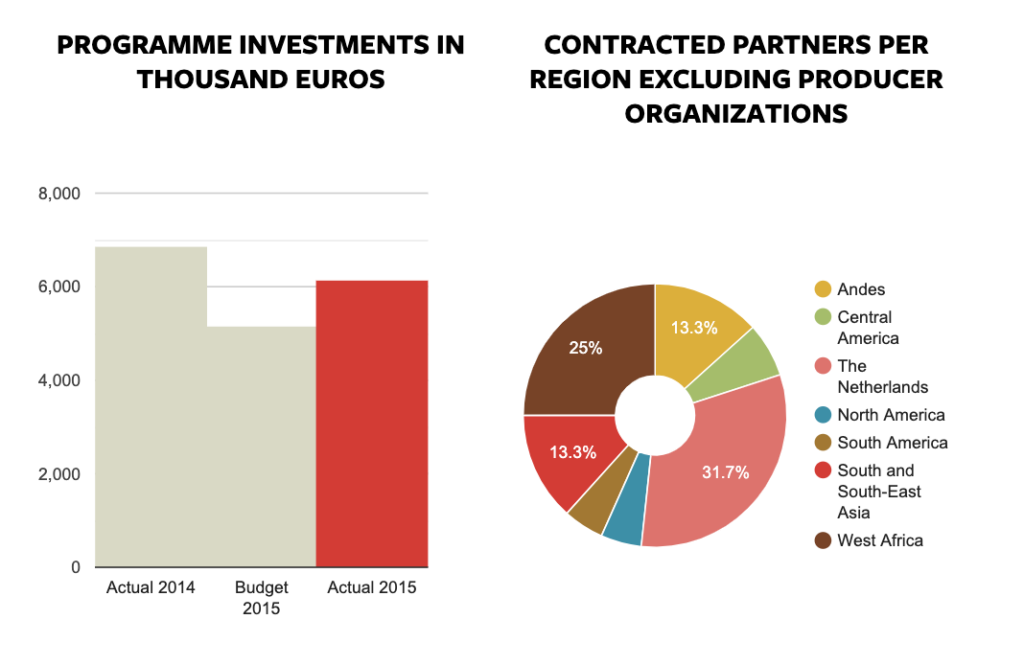
PARTNERSHIPS
In 2015, Solidaridad worked closely with corporate partners such as Unilever, Rabobank, Royal Friesland Campina, Procter & Gamble, BASF and Henkel, as well as dozens of palm oil mills, traders and cooperatives. In many producer countries and the Netherlands, Solidaridad partners with the government and civil society groups such as WWF, Oxfam Novib, SNV and IDH. In recent years, Solidaridad has influenced policy through its support for the Roundtable on Sustainable Palm Oil (RSPO) and supported the RSPO national interpretation processes in Guatemala, Honduras, Ghana, Ivory Coast and Nigeria. Solidaridad also partners with governments and industry to develop domestic palm oil standards in Asia.

CHALLENGES
Current market requirements, with their emphasis on traceability, tend to push smallholders out of major brands’ supply chains. For palm oil value chains to be more sustainable, it is essential that smallholders are included. In 2016, Solidaridad will continue its efforts to build sustainable value chains with village communities, mills, traders and end buyers, while also working with RSPO to further improve smallholder guidance and support programmes.
To create truly global sustainable palm oil value chains with benefits for millions of smallholders and the protection of social and ecological values in all geographies, national sector associations and governments need to step in. Solidaridad aims to intensify cooperation with governments in Latin America, Africa, Asia and Europe in 2016 to create a level playing field, disseminate best practices and ensure benefits for smallholders, workers and communities.
CATALYSING CULTURAL SHIFTS IN SOY PRODUCERS
Solidaridad has been active in fostering and strengthening sustainable production of soy in Latin America and its sourcing in Europe through the Soy Fast Track Fund (SFTF) since 2011. The programme aims to help transform the global soy value chain into a sustainable one by using the Round Table on Responsible Soy (RTRS) standard as the main reference framework to guide improvements and implement change at the farm level.
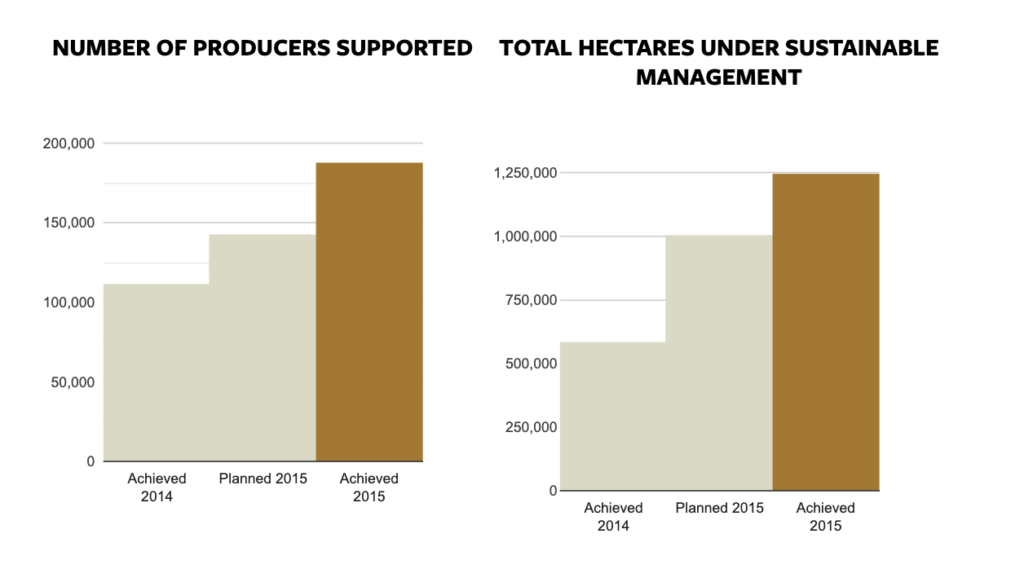
ACHIEVEMENTS
The programme has been able to trigger and bolster the certification of significant areas dedicated to the production and trade of sustainably certified soy. About 20% of the certified soy traded in the world has been triggered by this programme. If the entire surface area managed within the programme is taken into account, this figure rises by an additional 44%. RTRS has reported an increase of more than 35% in the certified area from 2014 to 2015. The SFTF has clearly played a crucial role in assuring the availability of certified product and has significantly contributed to RTRS´s objectives.
From 2011 to 2015, a total of 43 projects were contracted by Solidaridad in partnership with implementing partners. Together we invested almost €6 million to incentivize the sustainable production of over 4.4 million tonnes of soy, covering an area of over 1.6 million hectares. We also leveraged co-funding of over €11 million and included over 3,000 producers / farmers in the region, ranging from large agribusiness companies to local smallholders. Results show an over-performance in regard to the targets established in the design of the programme.
A significant outcome of the programme has been its contribution to cultural change and awareness. The SFTF has increased the producers’ sense of responsibility towards their communities and allowed them to understand how complex their operations are in terms of their impacts.
Rural Horizons software has been successfully developed within the SFTF, adapted for local contexts and embedded into farmer organizations to facilitate capacity building and continual improvement. Almost 1,000 producers have used the tool so far.
In 2015 100% of the soy used for feed in the Dutch dairy sector (about 300,000 tonnes) was certified under the standard of the Round Table for Responsible Soy (RTRS). The criteria required this soy to be produced under responsible labour conditions and while protecting important habitats. The dairy sector is thus adhering to the Memorandum of Understanding on Responsible Soy that it signed in 2011 with Solidaridad and other NGOs.The partnership with Marks & Spencer in Paraguay ended in 2016. The only remaining partnership is with Dutch Sustainable Pork Value Chain Association, which supports the Mozambique soy programme. Additionally, Solidaridad cooperated closely with the dairy sector that sources 100% RTRS “book and claim” soy in Netherlands, and through ARLA in Denmark and Sweden.

A large region in the center of South America is facing rampant deforestation due to unrestrained expansion of soy farming. Solidaridad, with support from the Gordon and Betty Moore Foundation and the Earth Innovation Institute, undertook the development of strategies to decouple farming and deforestation in Argentina and Paraguay.

Five years ago, soybean produced under sustainable schemes was almost non-existent in the region. Today, however, a group of leading producers have set the precedent that responsible production is possible, affordable and good for business.

Solidaridad is supporting smallholder soy producers to produce more with fewer inputs, use land and water efficiently and participate in multi-stakeholder engagements. This will help to improve livelihoods of a large number of smallholders by reducing poverty and creating better societal relations and ecologically sound supply chains.

Solidaridad Southern Africa was involved in two soy projects: one through the National Smallholder Farmers’ Association of Malawi (NASFAM) and one in Mozambique through Technoserve. A programme for promoting responsible soy in Mozambique and Malawi was part of the Farmer Support Program which came to an end in October 2015.

DEVELOPMENTS
Certification schemes were initially seen as the essential tool to drive change within the soy value chain, but ground and market tests revealed unforeseen restrictions that emerged after the standards were launched. As a result, market uptake for certified soy has remained low. This trend has shifted the focus of discussion beyond certification and toward concepts such as sustainable landscapes and jurisdictional approaches.
These new solutions may provide a route to increase the rate of transformation within the value chain as they are more comprehensive, systemic, inclusive and larger in scale with lower financial barriers. They are also adjusted to local realities and create opportunities to work with government sectors.
Solidaridad has responded by taking a proactive stance and including cross-cutting themes such as sustainable landscapes into its strategy. Projects are already under way with funding and deploying activities on the ground, allowing Solidaridad to create synergies within its network by bolstering South-South cooperation.
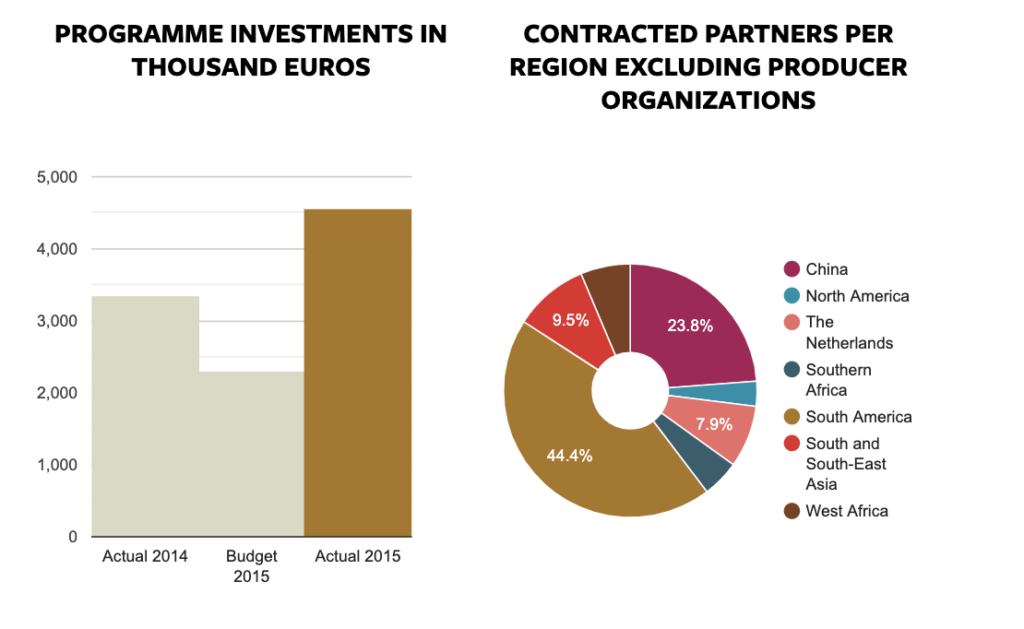
PARTNERSHIPS
Our single most influential partner donor has been IDH. The relationship to date has been steady. Solidaridad has proposed several improvements in the management of the programme along the way and the donor indicates satisfication with the overall management.
An additional collaboration was the launch of a Learn and Share project that aims to publish data, testimonies and experiences in a document reflecting the main lessons learned in the field by its participants. Disseminating the findings and experiences of the programme will increase the visibility and profile of Solidaridad in the region and help bolster institutional relations.
Solidaridad’s partnership with IDH has enabled us to pursue landscape approach projects, although the future of the collaboration is uncertain as IDH has yet to share its plans. In terms of implementing partners, Solidaridad has been able to roll out the programme by building relationships with over 30 different soy producer organizations.

CHALLENGES
Deforestation remains the major issue surrounding the commodity in the region covered by SFTF. Solidaridad´s strategy had been to promote certification as a means to stop deforestation, but this has had limited results in the market context. Our response is to develop pilots in different regions to test the fitness of different deforestation policies in the next five-year strategy plan.
A major challenge for the SFTF has been the lack of project management capabilities in nearly all implementing partners. It will require a high level of effort and energy to move implementing partners through the management process of each project. Stages include providing frameworks, supplying information, helping partners, communicating new concepts, building budgets, explain how monitoring could be done, completing paperwork, explaining indicators and collecting data. Delays have been caused by errors in reports, sources of information and the need to trace them.
The programme has provided learning opportunities at various levels. At a project level, Solidaridad needs to establish a stronger presence in the field to bring project activities within the scope of its control in order to mitigate risks associated with implementation. Certified Soy market constraints have forced the programme to shift from a certification-based approach to a proto-landscape approach with eight projects now active in the region.
SMART SOLUTIONS QUENCH SUGARCANE’S THIRST FOR WATER
Water scarcity is one of the main long-term challenges for many sugarcane growing regions around the world. This is why Solidaridad has initiated public-private partnerships in South Africa and India to increase the amount of crops produced per drop and reduce agricultural demand. Solidaridad and our partners will build on tried and tested approaches to increase smallholder sugarcane production and improve water stewardship with the help of satellite derived data.
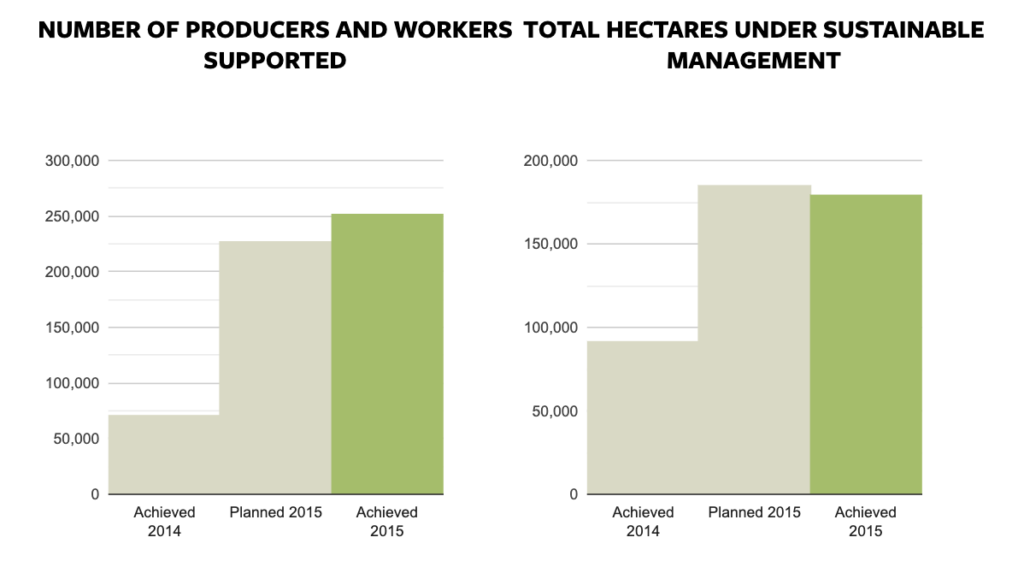
ACHIEVEMENTS
In El Salvador, our partners found strong evidence that improving labour conditions for sugarcane cutters can stop the decline in kidney function while improving productivity by 40%. This is significant in the struggle against chronic kidney disease, which disproportionally affects sugarcane field labourers. New and bigger field trials in the 2015/16 harvest are expected to further increase our understanding of how to combat this epidemic.
Our partnership with the IFC in India now involves 14 mills, making it probably the single largest sugarcane specific intervention in the world. The project has yielded encouraging results such as yield increases of 10% to15%, and 129 billion litres of water saved. Solidaridad is proud to have supported EID Parry’s Pugalur unit in becoming India’s the first Bonsucro certified mill in Asia.
Our partnership with Raízen in Brazil provided opportunities for both organizations to innovate and become more effective in helping sugarcane farmers to improve their performance. The ELO programme centres on building relationships with farmers, using Solidaridad’s Rural Horizons digital self-assessment platform.
REGIONAL COMMODITY PROGRAMMES
- CENTRAL AMERICA
- EAST & CENTRAL AFRICA
- THE NETHERLANDS
- NORTH AMERICA
- SOUTH AMERICA
- SOUTH & SOUTH-EAST ASIA
- SOUTHERN AFRICA
Only two and a half years after launching a pilot sugarcane project in Mexico, Solidaridad has achieved international visibility as the leading organization in Mesoamerica capable of facilitating systemic change in the sugarcane sector, from best practices in the mill and field to occupational safety and health interventions that promise to eradicate chronic kidney disease among sugarcane cutters.

Solidaridad worked to support sugarcane farmers and producer organizations in increasing their sustainability and economic benefits. Cheap importation of sugar has influenced local cane prices negatively, leading to low incomes among the cane farmers. The expansion of sugarcane production in Tanzania was seen as an avenue for improved incomes. With the introduction of irrigation technology, land fragmentation will soon be curbed due to a block farming approach.

More European companies are increasingly interested in sustainability of sugarcane production, but at the same time, their relative influence on it is decreasing. Solidaridad The Netherlands is mainly supporting corporate and non-corporate partners to be successful in production countries.

While companies worldwide demand sustainably produced sugarcane, finding adequate supplies is a challenge. To that end, Solidaridad North America, with Bonsucro, is promoting a precompetitive alliance of sugar users that transforms industry-wide practices. Chronic kidney disease among Central American sugarcane cutters is one of the many challenges to be addressed. Solidaridad is engaging companies such as Kellogg Company to combat this epidemic.

With the successful conclusion of the market development campaign and RenovAção project, Solidaridad stands today as the most respected sector NGO in Brazil, one of the leading producer countries in the world. Solidaridad has proven its ability to integrate the entire supply chain and find innovative solutions to challenges both on farm as well as off farm.

Solidaridad South & South-East Asia worked in partnership with the International Finance Corporation (IFC) and leading sugar mills in setting the direction for water efficient sustainable production in India. This initiative has addressed two imperative issues: improving sugar business sustainability and providing economic benefits.

The capacity of smallholder sugarcane farmers was strengthened through increased productivity, comprehensive training, organizational development, adoption of sustainable practices, improvements in bulk infrastructure, as well as increasing industry efficiency and competitiveness. This will contribute to reducing poverty by increasing incomes for smallholder sugarcane farmers.

DEVELOPMENTS
The global sugar market carried a surplus for the sixth consecutive year, bringing global sugar prices down to record low levels. Industries in leading sugar geographies have been in survival mode with many relying on co-generated electricity to boost their incomes. The ethanol market offered little solace in the face of fierce competition from declining gasoline prices.
The crisis has made many industries and governments around the world realize the need to increase industry resilience to market shockwaves and other external events. There is a need to deal with huge challenges the industry is facing within an all-encompassing framework. Sustainability is gaining in popularity as an approach because it is holistic and can respond to a wide array of challenges, from mill efficiency to climate change. Product diversification toward energy and other non-food applications also offers new ways of looking at the business model.
Solidaridad is working to connect this urgent need for a holistic approach within the industry with the needs and desires of its supply chain partners, financial service providers and donor agencies. This allows us to include the perspectives of workers, farmers and communities that rely on this sector. In our partnerships, we try to identify scenarios that are viable in the long term as well as beneficial in the short term.
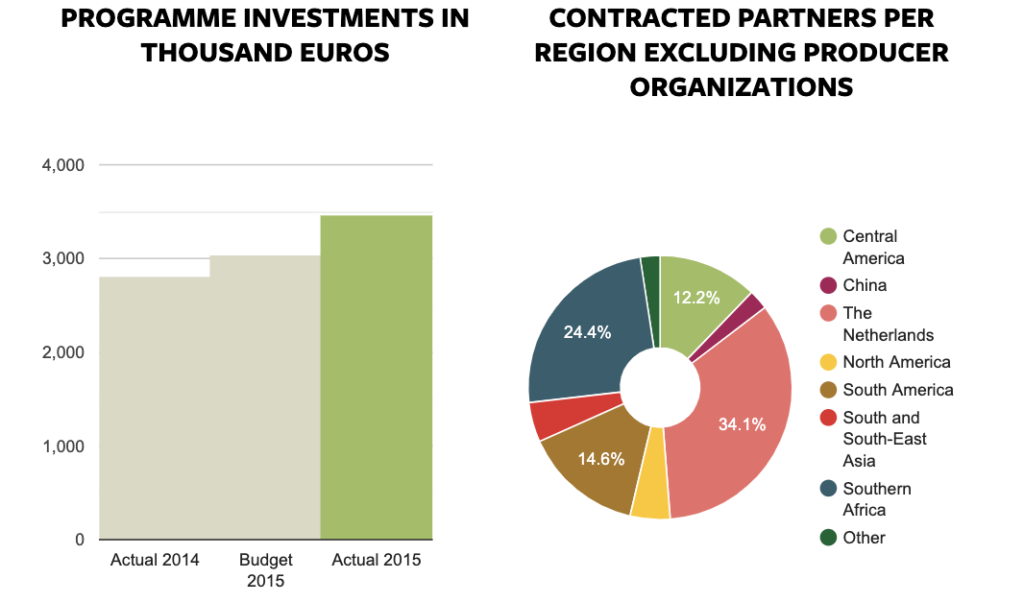
PARTNERSHIPS
The year 2015 brought an end to many partnership projects under the Farmer Support Programme, which have strengthened our relationships with relevant stakeholders around the world. However, we have been able to continue many partnerships with alternative resources. Transformational change often requires relationships to be built up over a longer period of time and we are grateful to our partners for recognizing this.
Solidaridad remains an active member of Bonsucro and has campaigned vigorously to broaden its scope from certification to meaningful change. Bonsucro is an increasingly robust organization and our involvement has benefited the quality, reach and profile of our work. Bonsucro and Solidaridad entered into a regional partnership called PanAmericaña to accelerate change in sugarcane production practices across Latin America.
Two new public-private partnerships were initiated in India and South Africa with the support of the Netherlands Enterprise Agency. The partnerships go beyond our usual collaboration with farmers and industry to include research organizations, government bodies and technical service providers. These are the types of partners we will need to face future challenges such as water scarcity.

CHALLENGES
The global sugar market is expected to go into deficit next year and sugar prices are showing signs of improving. However, many farmers and industries struggle to invest in long-term viability due to a lack of resources or opportunities for investment.
Many of the industry’s challenges can only be addressed at the policy level. Sugarcane is often called the most political of crops, and this can make it difficult to achieve quick policy changes. Solidaridad is creating more interventions and partnerships at this level and will perform landscape-level interventions beginning in Zambia, Honduras and India, which will create opportunities for learning and improvement.
Similarly, while there is a desire to modernize in many sugarcane origins, there is a tremendous lack of qualified and affordable commercial agricultural service providers. It is this sector, rather than NGOs, that needs to embrace a more holistic approach toward service provision. Solidaridad is engaging with financial service providers and input providers as well as developing the technical capacity to stimulate this sector worldwide.
FUTURE LOOKS HEALTHY FOR GLOBAL TEA SECTOR
Served every morning to nearly two-thirds of the world’s population, tea continues to be the most popular non-alcoholic beverage and has gained further popularity as a health drink in view of its medicinal value. Developing sustainable supply chains in Asia remains an important challenge, as producers and smallholders continue to operate outside the scope of global sustainability programmes even though 74% of the world’s tea is consumed in Asia.
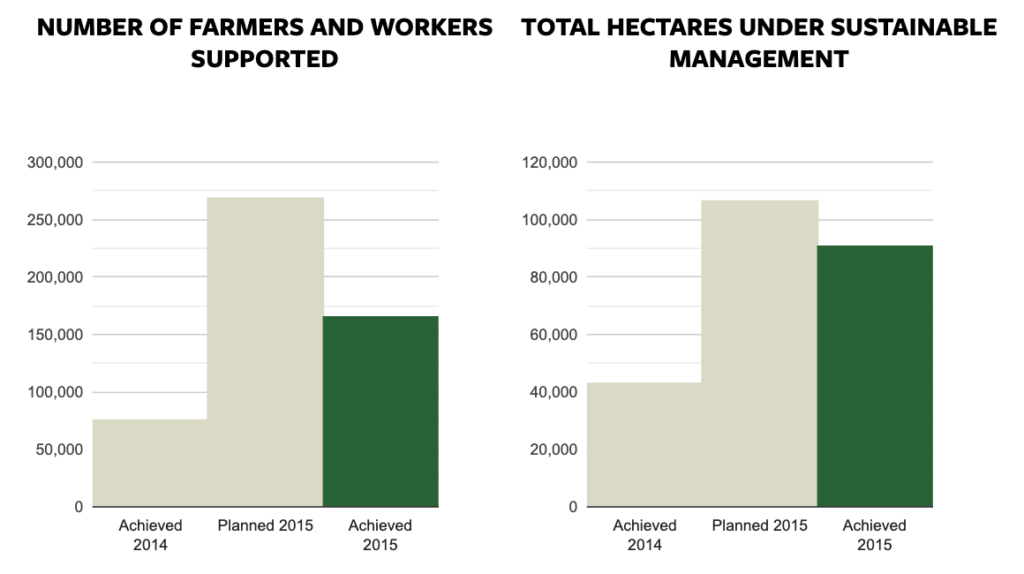
ACHIEVEMENTS
In South America, the approach with producer associations in Yerba Mate has closely followed the example of Argentina between 2010 and 2014 with continual improvement schemes focused on raising productivity and legal compliance.
In Paraguay, a project initially targeting around 200 members of Colonias Unidas cooperative expanded to reach 1,200 producers directly and indirectly. Specialists from Argentina were brought in to build local capacity, train 26 trainers and set demonstration plots to disseminate results. Fertilization and pruning practices were adopted by 95% of producers.
In Argentina, a total of 689 producers and 192 workers were trained in good agricultural practices, natural resource management and safe use of agrochemicals. This amounts to 2,575 hectares operating under better management practices.
In the Eastern & Central Africa region, interventions focused on building the capacity of smallholder farmers to adapt to climate change and mitigation for resilience. Four managers, four tea extension staff and 27 lead farmers from one tea factory took part in a training-of-trainers (TOTs) programme.
In the India Sustainable Tea Programme, Trustea’s main focus is to accelerate the transformation of the Indian tea market in partnership with industry stakeholders. The four-year programme seeks to sustainably transform 400 million kg (8% of all black tea in the world) or 33% of all tea produced in India. The programme will benefit around 500,000 workers and 40,000 smallholders who are growing tea on around 300,000 hectares of land.
REGIONAL COMMODITY PROGRAMMES
Tea is an important commodity in the Eastern and Central Africa region, contributing to improved livelihoods in households and macro-economic development for the countries. Tea is also a major contributor of foreign exchange for the East Africa Community (EAC) countries, employing thousands of people from the local population and providing a source of livelihood for over 10 million citizens.

After five years, Solidaridad’s tea programme in South America crossed the frontiers of Argentina and landed in Eastern Paraguay. This expansion was the result of Solidaridad’s shift to yerba mate cultivation in 2014 in Argentina. Yerba mate is highly appreciated among smallholders as a fast return cash crop to diversify production. Increasing yields by adopting good practices opens an opportunity to improve income and living conditions.

The Trustea programme seeks to facilitate a locally developed Indian tea code which is meaningful, cost effective and practical to implement without compromising on globally accepted core sustainability standards. The programme was developed after a series of consultations with Indian tea industry stakeholders because it is one of the largest in terms of size and targets for introducing sustainable tea in India for the first time.

DEVELOPMENTS
The year 2015 saw the culmination of a decade-long campaign by civil society organizations in Europe to persuade tea businesses to improve their sustainability performance. By 2015, most teas in Western Europe were supplied by certified sources using one of the global standards such as RA, Fair Trade or UTZ Certified.
Most global tea packing companies have committed to introduce sustainable tea in all markets where they operate, which affects Asian tea markets as the bulk of world’s tea is produced and consumed in this region. Examples of such programmes are the Lestari and Trustea initiatives in Indonesia and India respectively.
Globally connected businesses are facing regular scrutiny from international agencies who have launched major campaigns highlighting some of the alleged abuses that prevail in the tea sector. Within the market, some tea blending and packaging activities have been moved to producer countries in a strategic shift by packers in consumer countries. Supply chain costs have increased as processing and distribution costs rise, mainly due to rising fuel costs. The FAO has identified persistent problems of oversupply in the world tea market that have put downward pressure on world prices and called for an expansion in demand and reduction in supply to achieve market balance.
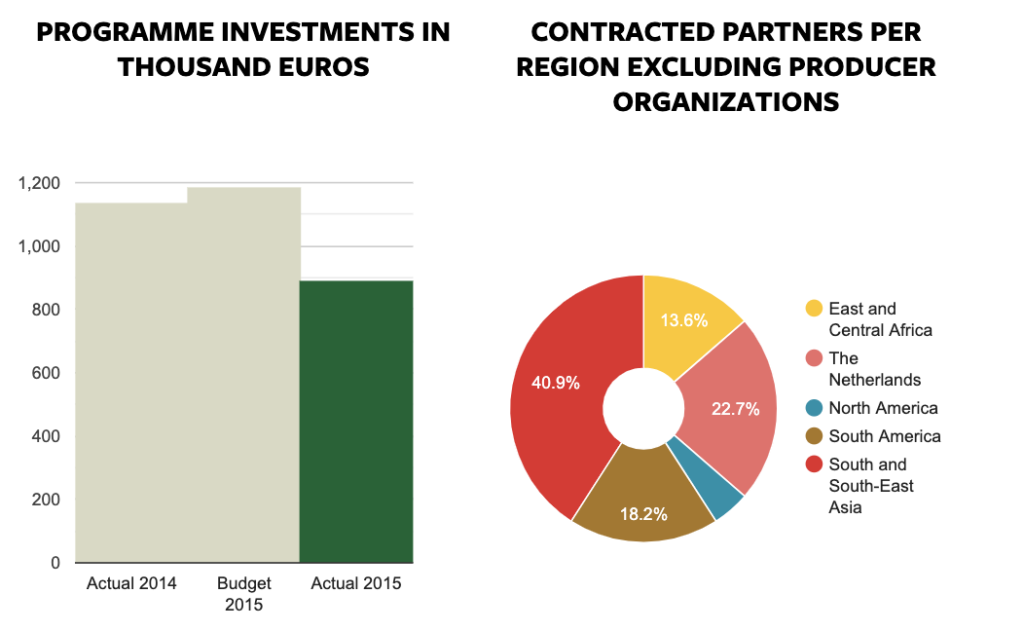
PARTNERSHIPS
Donors for the yerba mate programme include the Dutch embassy and Syngenta Argentina. The latter is a new partnership to develop the Rural Horizons tool in 2016.
In Paraguay, the main partner is Colonias Unidas cooperative, while in Argentina, after a year of scoping, the partners chosen were:
- Cooperativa Dos de Mayo Ltda.
- Cooperativa de Productores yerbateros de Soberanía Ltda.
- Cooperativa Agrícola Unión Ltda.
- Establecimiento Don Germán SRL
- Establecimiento Don Leandro SRL
- Yerbatera del Nordeste
Solidaridad East & Central Africa received funding from Irish Aid for its climate change project and the Centre for Promotion of Imports (CBI), an agency of the Dutch Ministry of Foreign Affairs, to implement the market access project.
In the climate change project, we partnered with smallholder tea factory Gitugi in training the trainers on climate change adaptation and mitigation. We partnered with the Tea Directorate of the Agriculture, Fisheries and Food Authority (AFFA), the Tea Research Institute (TRI) and Ethical Tea Partnership, a regional members’ organization, and the East Africa Tea Trade Association (EATTA) to organize a regional annual tea stakeholders conference attended by 139 delegates.
We worked with small and micro-enterprise (SME) tea packing factories, Meru Herbs and Home Comforts, who are involved in direct tea exports. Solidaridad in Africa helped them to implement a food safety management system (FSMS) based on HACCP principles. A new partnership was started with Mau Tea Multipurpose Cooperative Society to implement the SAN standard for RA (Rainforest Alliance) certification.
In Malawi, a joint project with three certification organizations – Ethical Tea Partnership (ETP), Rainforest Alliance (RA) and UTZ Certified (UTZ) – ended in February.
The Trustea programme in India continued with active support of its funding partners IDH, Hindustan Unilever Ltd and Tata Global Beverages Ltd.

CHALLENGES
In South America, despite the increasing demand for yerba mate, profitability in the sector relies heavily on productivity. Producers with low plant density and inferior technological practices are predominant. Access to technical assistance has been effective, but to increase our impact more time is needed to build capacity and provide for trained and qualified technical staff.
The Eastern & Central Africa region has been heavily affected by the fluctuation in global tea prices caused by climate change as the region accounts for over one-third of global exports. Farmers’ returns have fallen due to low prices at auction. Because tea is sold in bulk at the Mombasa Auction, overproduction significantly leads to reduction in global prices causing a ripple effect. Suggested solutions include value addition and direct exports to tea consuming countries. Solidaridad, together with partners, has successfully intervened through the Market Access project.
The tea programme in the region has been affected for some time now by lack of funds. This has been brought about by a shift from cash crop interventions to food security issues. Tea is also seen as a political crop which attracts interest from national and county governments. Donors find the tea value chain to be high risk.
In the Trustea programme, the challenges Solidaridad and implementing partners are mainly faced with concern the small tea growers who are mostly unorganized.
CASTING THE DYE FOR SUSTAINABLE SECTOR TRANSFORMATION
China and Bangladesh remain the top textile production countries. Solidaridad continued concentrating its efforts on these production countries by bringing best practices to scale and contributing to solutions for complex issues such as audit duplication and fair living wages. With leading brands on the outlook for new sourcing destinations, Solidaridad began contributing to the sustainable development of the textile sector in countries like Ethiopia and Myanmar as well.
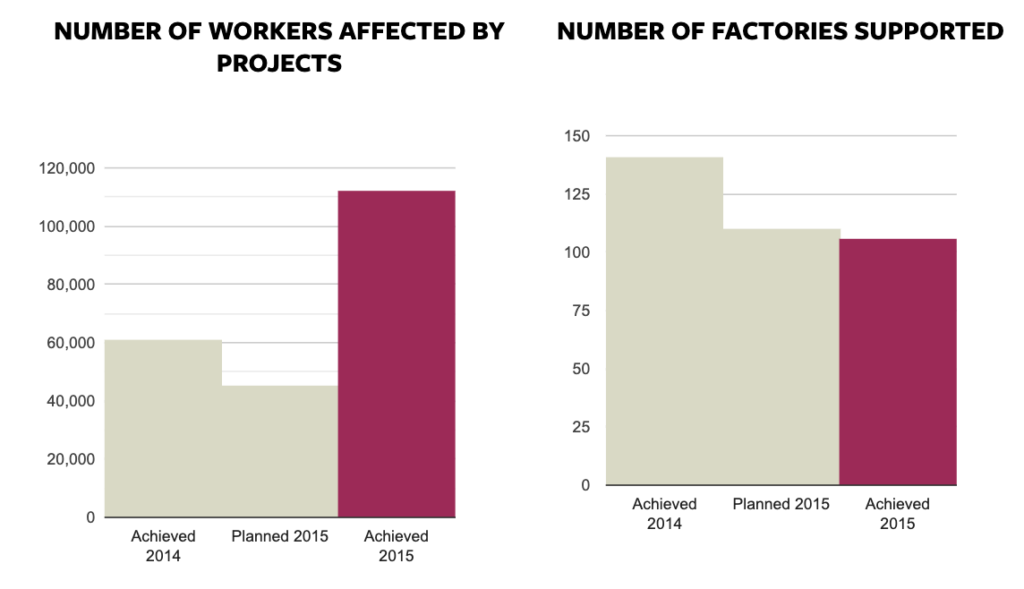
ACHIEVEMENTS
Brands and retailers are key players in the textile value chain that drive sector transformation through more sustainable buying practices. As an integral part of the Bangladesh PaCT Programme, Solidaridad trained 209 employees in partnership with MADE-BY at the head offices of five PaCT partner brands. In these workshops, buyers and designers gained more understanding of the environmental impact of design and sourcing decisions.
On the topic of fair living wages, Solidaridad started a pilot with the Fair Wage Network, two brands and a few suppliers in China. Besides direct dialogue and work with suppliers to improve wages in China, an extensive assessment of the partner brands’ buying practices is also part of this work. In addition, Solidaridad strengthened engagement with the Dutch market and contributed to the establishment of the sustainable clothing and textile agreement for the Dutch textile sector.
Our work in China and Bangladesh focused on promoting wider uptake of sustainable production techniques at supplier level. The Better Mill Initiative (BMI) in China achieved significant impacts. A total of 38 mills invested in improvements over a period of 15 months which resulted into savings of 6,900 tonnes of chemicals, 138,000 tonnes of CO2 emissions and 9.7 million euros in costs. PaCT in Bangladesh, implemented by International Finance Corporation (IFC) in partnership with Solidaridad, provided similarly impressive results.
With a growing interest among brands and retailers in emerging producer economies, we expanded our efforts to these textile production economies including Ethiopia and Myanmar. The gap assessment related to sustainability issues in the textiles and garment sector in Ethiopia led to a partnership in December 2015 with Sympany to extend BMI from China to Ethiopia. In Myanmar, Solidaridad made a significant contribution in making sustainability an integral part of the industry’s 10-year plan.
REGIONAL COMMODITY PROGRAMMES
As the Chinese government is setting stricter regulations on wastewater discharge and labour costs in the textiles industry, factories are seeking support from Solidaridad’s Better Mill Initiative in order to achieve compliance.

Solidaridad’s interventions for textile have concentrated in Ethiopia, which is one of the fastest emerging economies in Africa, and is evolving as a potential textile and apparel-sourcing destination. We are convinced that growth of this industry has the potential to contribute to poverty alleviation, create jobs under good working conditions and provide livelihood opportunities for hundreds of thousands of people in the coming decade, particularly women. There is a need to integrate sustainability in Ethiopia right from the start.

In the early years of Solidaridad’s textile programme we have shown, together with our corporate partners, that sustainability in the supply chain is possible. However, to achieve sector level transformation we need more brands to engage with sustainability and think about how they can be part of the solution through their design and purchasing practices. This has been the focus of the textiles programme for Solidaridad Netherlands in 2015.

Solidaridad continues to position itself in a strategic role to bring established best practices to scale; mainstreaming sustainable design and procurement at brand level whilst promoting wider uptake of sustainable production techniques at supplier level. Concurrently, work has also begun in emerging textile producer countries where Solidaridad will seek to ensure the costly lessons from established markets are learnt.

DEVELOPMENTS
The increasing demand for garments world-wide is leading to a search for new sourcing destinations. In the last few years, Solidaridad has seen this labour-intensive sector become established in countries where there is sufficient availability of cheap labour. This encourages a “race to the bottom” which Solidaridad is trying to prevent.
With experience from the past 15 years, Solidaridad knows that a sustainable industry can also be a competitive one, which also allows for sustainable economic growth of the least developed countries. In its role as transition manager at this early stage, Solidaridad sees an opportunity to bring key stakeholders together including brands and retailers, producers, governments, knowledge institutes, the financial sector and civil society organizations to ensure sustainability is part of the sector’s growth strategy.
Production countries such as China and Bangladesh continue to be key in achieving sustainable transformation of the global textile industry. The Partnership for Cleaner Textiles (PaCT) and Better Mill Initiative (BMI) are clear examples of Solidaridad’s work in promoting a wider uptake of sustainable production techniques at supplier level. The two programmes – both in their third year of implementation – reached around 180 suppliers.
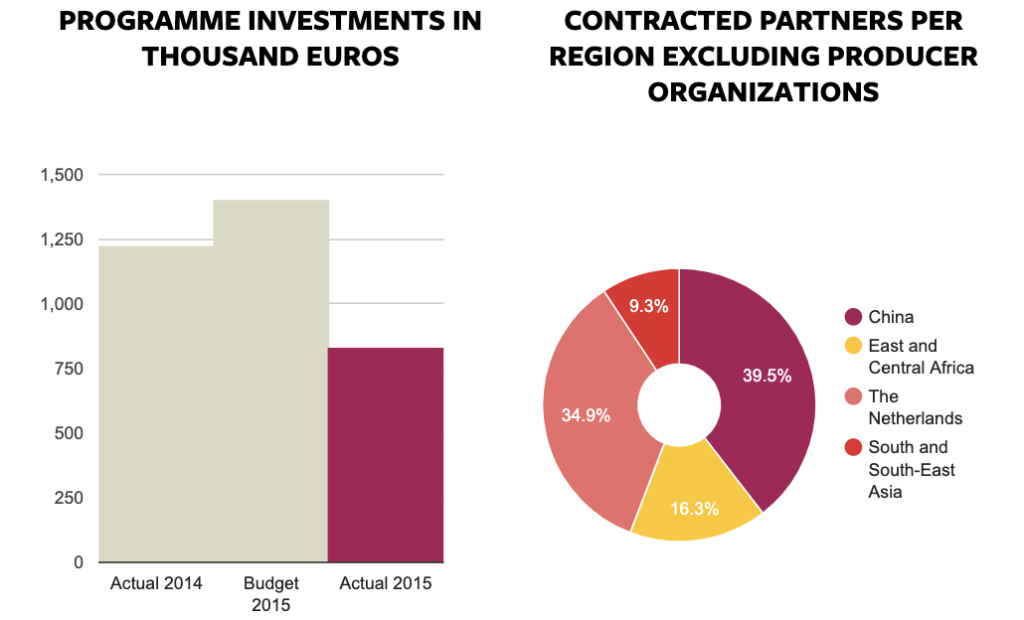
PARTNERSHIPS
The key players in the textiles value chain remain brands and retailers, through which Solidaridad influences mills, factories and producers. In 2015, a total of 11 brands, including H&M, G-star, C&A, Lindex and Primark, worked with Solidaridad in an effort to increase textile value chain sustainability.
Since 2014, Solidaridad has had a strategic partnership with H&M. Besides supply chain improvement work, integral elements of this partnership include close communication and being a critical partner. A lot has been achieved through this partnership, yet there is still much to improve. We need to keep challenging each other to take fashion sustainability to the next level.
In addition to brands, Solidaridad actively engages with multi-stakeholder initiatives including the Sustainable Apparel Coalition (SAC). Solidaridad supports SAC’s objective to move away from certification toward continual improvement of textile and apparel production through measuring and communicating impact.
Organizations such as the International Finance Corporation (IFC), ASN Bank and the Dutch government continue to be key partners for Solidaridad. Together with ASN Bank, Solidaridad launched a highly successful textile campaign in 2015. The Dutch government continues to support and enable our work in India, Bangladesh, Myanmar, Ethiopia and the Netherlands.

CHALLENGES
We believe our comprehensive approach to textile supply chain sustainability will continue to change the industry. Programmes already have the support of multiple stakeholders including major brands, producers and governments. However, we need to engage with more and new stakeholders and align our efforts to achieve true sector transformation. Developing programmes from the pilot to mainstream phase requires innovative strategies that will drive large-scale adoption by mills and factories across key sourcing regions. This will be a priority for our textile programme in the years ahead.
ORGANIZATION
STAFF & DEVELOPMENTS
Solidaridad is an international network organization with partners all over the world. There is one agenda and one strategy: together we learn and progress, together we achieve results and together we decide on future steps.
During 2015, Solidaridad consisted of 10 regional expertise centres (REC) throughout the world with a network secretariat connecting the RECs. The Solidaridad Network Secretariat (officially Solidaridad Network Foundation, founded in 2011) is located in Utrecht, the Netherlands, in the same office building as Solidaridad Netherlands, one of the regional expertise centres. The Solidaridad Network Secretariat consists of the Executive Director and a small team of specialists for delivering the following services that support the whole network:
- Providing services for the development and enforcement of our quality assurance systems and standards for financial management, accountability and control, planning, monitoring and evaluation, ICT infrastructure and human resource management.
- Managing global communication, including our international website and the development of tools for global branding and communication.
- Facilitating the process of global policy development by supporting our global organizational entities such as the Executive Director, the Executive Board of Directors, the Global Commodity Teams and the Global Account Teams.
In 2015, Solidaridad Andes and Solidaridad South America worked toward a merger that became effective per January 2016. The new name of this regional expertise centre is now Solidaridad South America with headquarters in Lima, Peru, under the ultimate responsibility of the current managing director, Gonzalo La Cruz. The previous managing director of Solidaridad South America, Jeroen Douglas, has returned to the Netherlands and will continue to work for Solidaridad from the Network Secretariat.
ORGANIZATION CHART

Click to enlarge image
All managing directors must adhere to agreed policies and stimulate optimal cooperation, open communication and knowledge exchange between the RECs. Furthermore, they are responsible for fostering a “giving factor” between RECs, making fair deals on payment for joint and mutual services, and joining forces to operate more effectively.
LEGAL STRUCTURE
In order to ensure effective daily operations and an efficient payment structure, the 10 regional expertise centres in 2015 were grouped on five continents, each with their own supervisory structure. Legal entities for these five continental Solidaridad regions are established in Utrecht, the Netherlands (for Europe), San Francisco, USA (for North America), Panama City, Panama (for Latin America), Nairobi, Kenya (for Africa) and Hong Kong, China (for Asia). In mid-2015, a consistency check was initiated to ensure that all legal entities have the most optimal connection to the appropriate supervisory boards.
STAFF PER REGION
The total number of employees that were employed throughout the Solidaridad Network as of 31 December 2015 was 391 (2014: 364 employees). The 391 employees corresponded to 359.5 FTE by the end of 2015.

GENDER DIVERSITY
Solidaridad firmly reinforces equity and diversity principles and practices applied across the employment lifecycle to support and improve gender equality outcomes in the workplace.

Of the 391 employees, 122 employees were female (31%). The table above shows the male / female division per continent.
SUPERVISION & MANAGEMENT
Solidaridad’s governance structure is based on the continental European governance model. This means, amongst others, a board with a two-tier structure, emphasis on dialogue with stakeholders and focus on achieving consensus. This governance model follows the subsidiarity principle. It aims to ensure that decisions are made as closely as possible to the deepest levels in the organization and that constant checks are made to verify that actions across the Solidaridad Network are justified in light of the possibilities available at the continental, regional or national level.
Within Solidaridad, the International Supervisory Board (ISB) is the highest level of international oversight. The ISB monitors policies, the quality of programmes, financial control and the performance of the Executive Board of Directors (EBoD). Direct supervision of the regional expertise centres (REC) is organized by continent. Each Continental Supervisory Board (CSB) is represented in the ISB by its chairman, thus enabling the ISB to focus on the interest of Solidaridad Network as a whole, instead of focusing on individual RECs. The members of the ISB are:
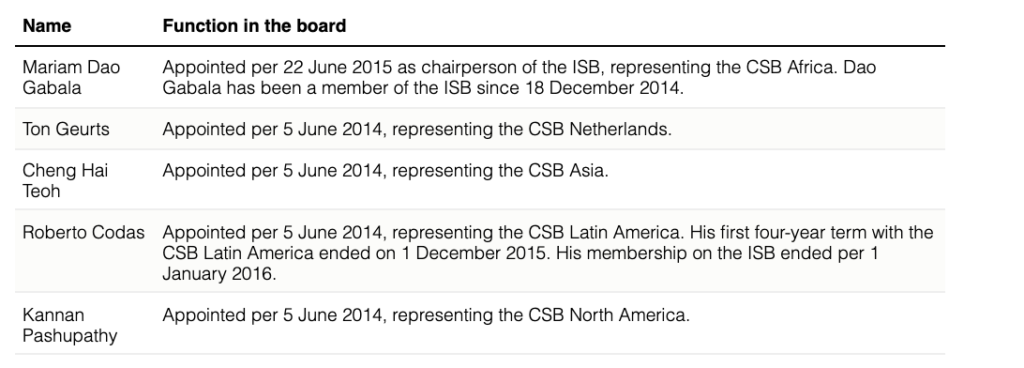
The ISB met twice in Amsterdam in 2015 (June, December). The approval of the new multi-annual strategic plan 2016 – 2020 was an important topic on the agenda.
The Continental Supervisory Boards are entering the mature stage of taking on their role. The boards strive for an optimal composition of five members, respecting a balanced composition in terms of gender, regional representation and areas of expertise and knowledge.
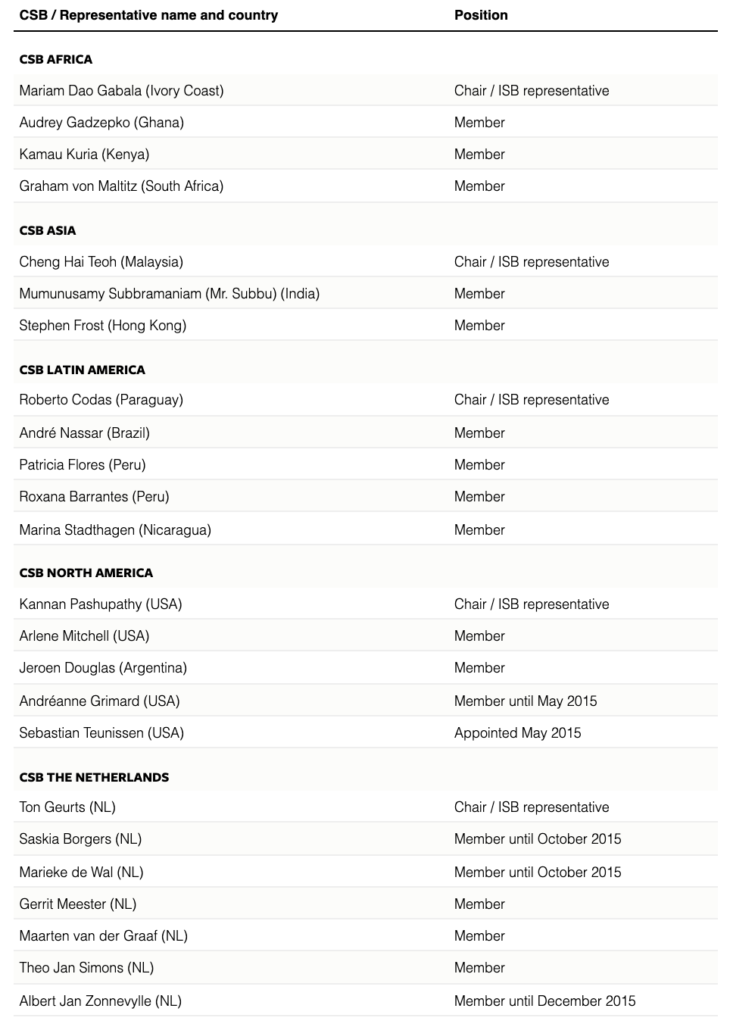
REMUNERATION
The Solidaridad Network Foundation and Solidaridad Netherlands adhere to the Dutch Wijffels Code and the VFI’s Guidelines for the Remuneration of Directors in Philanthropic Organizations (Adviesregeling Beloning Directeuren van Goede Doelen). The latter proposes a framework for annual incomes of management positions in philanthropic organizations. Furthermore, remuneration of all employees of the Solidaridad Network Foundation and Solidaridad Netherlands is based on the so-called “BBRA scales”, the salary scaling system that is used for civil servants working for the Dutch central government.
In 2015, the BBRA scaling system was also adopted for all managing directors of the Solidaridad Network. The job description of a managing director places the function in BBRA scale 14 to 16, depending on seniority and experience.
In accordance with Solidaridad’s statutes, neither the members of the International Supervisory Board nor the Continental Supervisory Boards of Solidaridad receive remuneration of any kind.
COMMODITY PROGRAMMES
The Solidaridad Network has a dedicated global team of specialists for planning, monitoring, evaluation and learning. In 2015, Solidaridad concentrated on modernizing and improving our internal systems to be able to track progress and impact worldwide. Every project and partner organization has been included in our new system, which allows us to track and verify our global performance indicators.
In the period 2011-2015, performance indicators were mainly related to Solidaridad’s outreach in terms of numbers of beneficiaries, factories, companies, hectares under sustainable management etcetera. This will change in the coming five years to be aligned with Solidaridad’s multi-annual strategic plan. Next to measuring our results in terms of sustainable agricultural and mining practices, we will measure new global indicators related to:
- robust infrastructures for farmers and miners (access to services, credit, and markets)
- enabling policy environments
- sustainable landscape management
Measuring the progress of these new result areas requires new approaches for measuring our global performance indicators. We will be piloting and improving these approaches in 2016.
In 2015, however, eight projects were evaluated by independent external evaluators. Some key insights are summarized below.
SOY PROJECT IN BOLIVIA
The project has resulted in benefits for the farmers in terms related to cost reduction, increased management capacity, more decent working conditions, legal compliance, a better reputation, increased productivity and increased environmental consciousness. A weakness mentioned is the lack of market linkages for certified soy: 95% of the Bolivian soybean production is processed and commercialized in the Andean community where there is little demand for certified products.
GOLD PROJECTS IN UGANDA, TANZANIA AND KENYA
Conclusions drawn from evaluations indicate that the income of small-scale gold miners has increased. There is evidence of less casualties due to better safety measures, of less child labour and of improved health due to more controlled use of mercury and less labour intensive techniques. In terms of environmental rehabilitation, promising results have been achieved through tree planting, covering and in-filling of pits, but these results are not widespread. There is evidence of some improvement in terms of women’s roles and gender-based power relations. The project has successfully contributed to preventing children under 18 from working in the mines. However, there remains several health, education and safety problems at community level. More attention is needed to adequately recognize the rights and specific needs of casual/daily labourers that form a significant part of the workforce within the mines.
COTTON PROJECTS IN ZAMBIA, TANZANIA AND MALI
The projects appear to be working well at the agronomic level with good operations by local staff and recognition by farmers. Results are weaker on social areas such as working conditions and child labour in Mali, or gender considerations in Zambia, which are strongly linked to poverty and illiteracy rather than programme intervention. In contrast, a large proportion of the integrated newcomers in Tanzania were female farmers. An important lesson learned is that improved dialogue and cooperation between different policy and development leaders is required to create a better enabling environment for the smallholder cotton producers. Access to finance is needed to buy draft animals or tractors for working the land. More support and proper regulations are needed to create more profitable and more sustainable cotton-production by smallholder farmers.
TEXTILE PROGRAMME IN BANGLADESH (PACT)
The innovative Cleaner Textile Programme in Bangladesh (PaCT) is implemented in cooperation with the International Finance Corporation. The results of the mid-term evaluation in terms of capacity building of the textile industry are positive. PaCT has created factory-level user group meetings to help factory managers share best practices and experiences in Cleaner Production (CP). It has set up Textile Technology Business Centers to disseminate information on emerging technologies and service providers. PaCT is supporting the development and enforcement of more CP-friendly regulations. The existence of the CP audit and advisory businesses in Bangladesh is partly attributed to the PaCT programme. Finally, PaCT strengthens management capacity through awareness workshops and CP interventions.
FINANCES
The Solidaridad Network implementation budget remained relatively stable in 2015. In fact, our budget continues to grow year on year, which is an indication that the level of support from our external donors and partners is also increasing. As in previous years, Solidaridad Netherlands holds the largest share of contracted income, but we also see that financial contributions from other regional expertise centres (REC) are growing each year. These indicators confirm the effectiveness of Solidaridad’s innovative model of continental contracting, supported by a continental governance system.
AGGREGATED BUDGET
The total amount that Solidaridad Network invested in 2015 was €41.7 million, just below the budget for the year which was set at €42 million.
The figures below present the aggregated income figures of all entities within Solidaridad Network. Aggregated means that income sent and received between RECs has been removed. These figures provide an overview of the total budget of all Solidaridad entities together. In alignment with the governance structure of Solidaridad Network, consolidated financial statements are not prepared. The audited financial statements of each REC are published on the respective annual report pages for those RECs:
- The financial statements of the Network Secretariat are published here (PDF).
- The Annual and Financial Reports of Solidaridad Europe are published here.
While the financial statements of each individual REC are audited, the aggregated financial figures presented here are for information purposes only and have not been subject to financial statement audits.
Income Statement Solidaridad Network 2015
in € 1,000
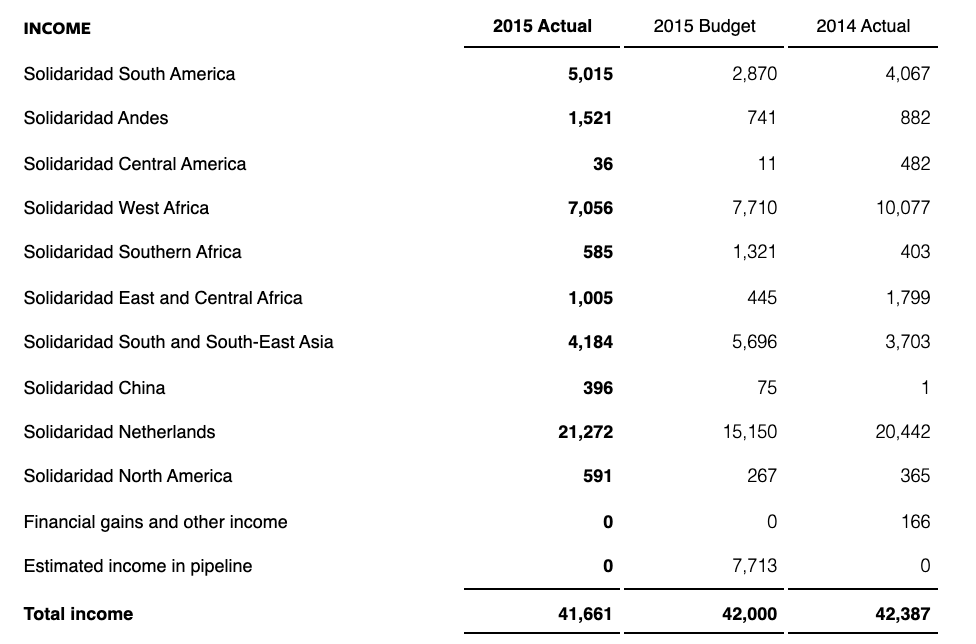
Solidaridad budgets only contracted income and reports on income that has been utilised as actual. The risk that budget is not achieved is limited to the extent that contracted income is not fully utilised in the current year.
Solidaridad has set a budgetary target of €45 million for 2016.
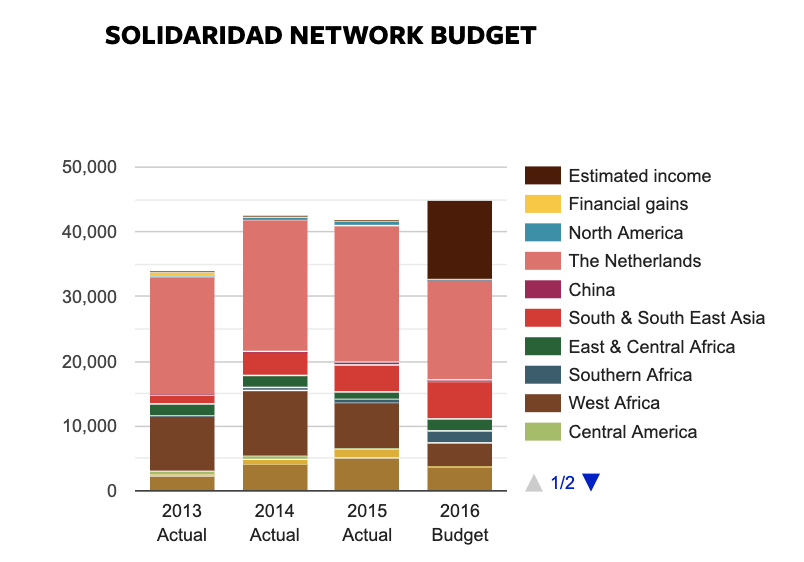
The figures presented above cannot be accumulated to represent aggregated income and expenditure because they contain inter-regional funding flows.
NETWORK INCOME & EXPENDITURES
Income per regional expertise centre (REC) is split between what a REC has formally contracted itself and what has been received via other centres. The total expenditure of a REC generally provides a good idea of its size and the level of its activities. Project expenditure has either been invested via other organizations in the Solidaridad Network or has been invested by the REC itself.
Salary costs in one expertise centre are difficult to compare to those in another. On an absolute level, salary costs vary between RECs because they depend on price levels – and inflation – in the regions. Relative comparisons also reveal differences. Organizations that use external consultants on their projects have a relatively low level of salary cost. Smaller expertise centres spend a relatively large portion of their total costs on salaries. Lastly, some RECs are more engaged in activities such as fundraising, communication and market linkage.
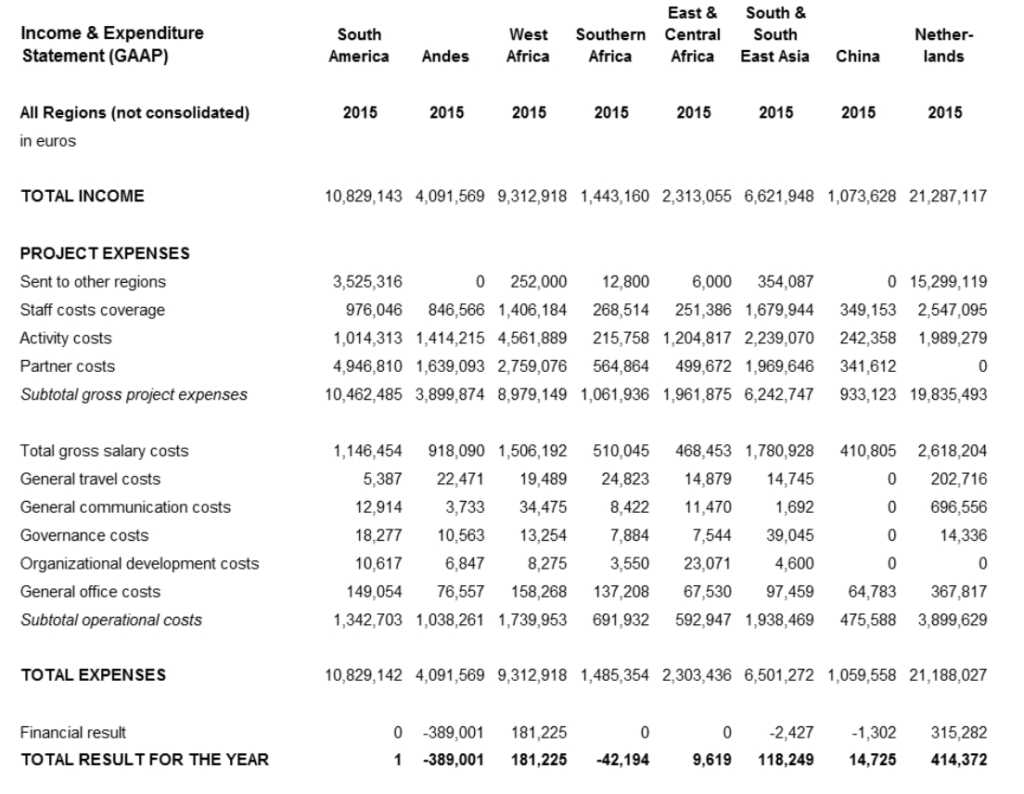
SYSTEM DEVELOPMENTS
Solidaridad aims to achieve a high quality on all fronts, which is particularly important in the area of financial management and control. Since the creation of our worldwide network, the team of financial controllers has been working on aligning the global internal control system. Each regional expertise centre (REC) produces annual financial statements that are audited by external auditors. Furthermore, four RECs (Solidaridad Netherlands, Solidaridad West Africa, Solidaridad East & Central Africa and Solidaridad South & South East Asia) are certificied under the ISO 9001:2008 norm.
NETWORK ACCOUNTING METHODS
All RECs are continually striving towards enforcement and global alignment of our systems and standards for financial management and control. In 2015, a new cloud-based system was implemented that can provide support in the following areas in an integrated manner: account management, fund management, financial management and planning, and monitoring & evaluation (PME) of projects.
Furthermore, steps were taken in 2015 to harmonize the accounting standards of the 10 regional expertise centers so that, as of 2016, all RECs can report their annual figures to the Solidaridad Network Secretariat on the same accounting basis. Starting in 2016, all RECs will prepare financial statements based on one standard format, providing a consistent level of transparency throughout the network. If needed, local financial statements will continue to be prepared according to local rules and regulations.
To continue with the improvement and harmonization of our internal control system, plans for 2016 include synchronizing all local fraud policies for a renewed global fraud policy, implementing a risk management system and continually improving our cloud-based financial management system.
QUALITY STANDARDS
Solidaridad Netherlands, the largest regional expertise centre of the Solidaridad Network, is entitled to use the quality mark of the Central Bureau on Fundraising (CBF) and complies with its requirements. The CBF monitors all philanthropic bodies in the Netherlands and evaluates their management and policy in order to increase the transparency of the charity sector.
The Dutch Association of Fundraising Organizations (VFI) is the umbrella organization for philanthropic organizations that raise funds across the Netherlands. Its goal is to increase public confidence in fundraising institutions. The Solidaridad Network Foundation and Solidaridad Netherlands uphold the principles of the VFI in relation to respect, reliability, openness and quality. These standards are promoted throughout the network. In accordance with policy of the Solidaridad Network Foundation, other RECs also respect the principles of the VFI.
